#antagonist analysis
Explore tagged Tumblr posts
Text
Let's talk about something different today. Jasper from Steven Universe is my favorite antagonist and I'm just going to casually explain why. So starting off with why I love her as an antagonist is that, Jasper is a huge threat, while she wasn't really much of an active threat she was still a huge threat ngl.
In her debut episode, Jasper managed to solo the Crystal Gems, poofing the strongest gem (at the time) Garnet and imprisoning the two other gems, Pearl and Amethyst while knocking out Steven in the process. When I first saw that when I was a kid, I was REALLY surprised because the crystal gems are extremely powerful in their own right but realizing that one gem took down the crystal gems with minimal effort shows how threatening Jasper is and how more threatening Homeworld as a whole is.
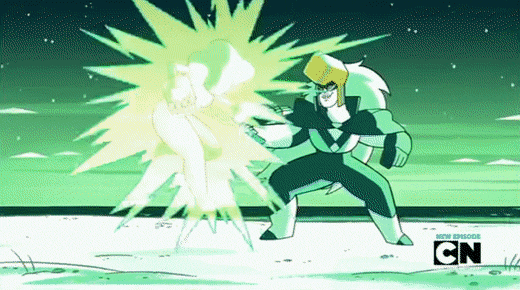
While Jasper was later on defeated by Garnet, it's still impressive because no other gem in Season 1 was really able to hold off Garnet, who was the strongest crystal gem at that time. So it takes a fusion between two gems to defeat Jasper which was shown consistently throughout Steven Universe. Not to mention the iconic battle in Steven Universe that somehow has fewer views on YouTube than the Undertale parody lmao. 💀
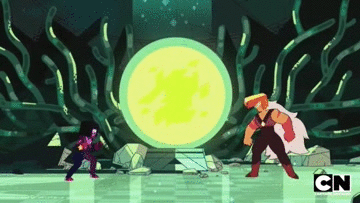
But then we move on to Steven Universe Future. After training a teenage Pink Steven for a while, Jasper with no hesitation fights him after Pink Steven challenges her. Let it be known that Pink Steven was gaining powers from his mom's gem who is Pink Diamond and despite the fact that Jasper was shattered in the end, she was still able to hold her own against a Diamond essentially.
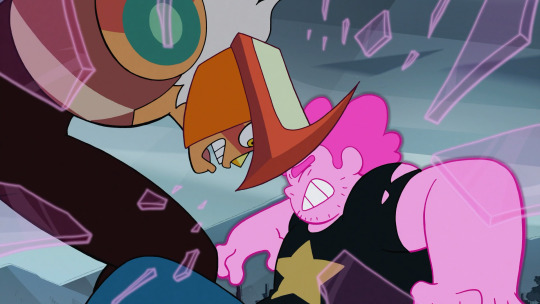
Jasper is definitely the strongest lone gem I've seen since she's able to mop the floor with other ordinary gems and only loses against Fusions or Diamonds. But it would be really interesting to see her fight against Spinel or Bismuth.
Another reason why I like Jasper is that to me, she's a foil to the three main characters Steven, Garnet, and Amethyst.
Jasper is big, tough, and strong while Amethyst is small, not as durable as Jasper, and definitely not as strong as her. Jasper is the perfect version of Amethyst, physically even Jasper points out multiple times in "Crack the Whip" and "Earthlings".
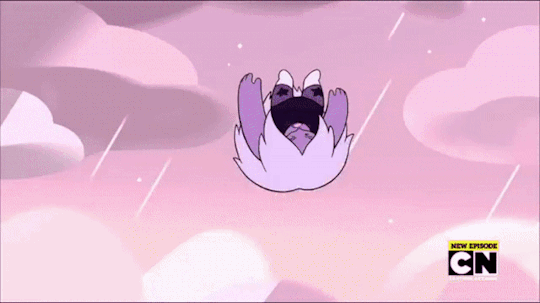
She constantly looks down on and berates Amethyst for being physically inferior to her, but Jasper doesn't have the meaningful relationships that Amethyst has. So Jasper has power, but no friends, and due to her lack of teammates she always loses against others who have teammates.
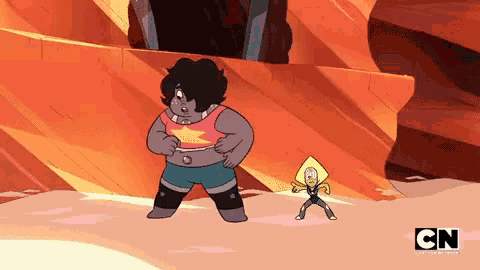
In Garnet's case, Jasper forces gems to fuse with her in order to become more powerful which can hurt the gem she's fusing with in the process and even herself. Garnet is a fusion out of the love of two gems and she's able to handle that form for a long amount of time as opposed to Jasper who was able to withstand a fusion with a corrupted gem for like a few minutes at most.
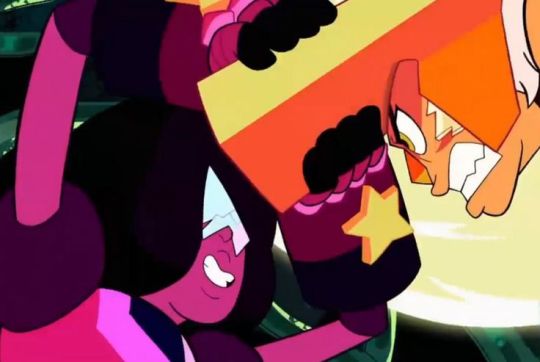
Jasper does not know that fusion requires consent or love, when she fuses with another gem she's essentially using them to gain power which led to gems not wanting to fuse with her or forcing themselves out of the fusion with her.
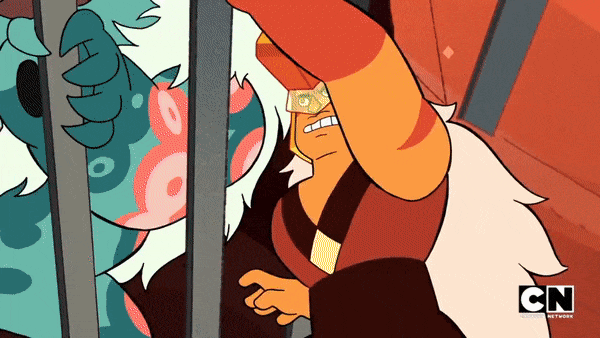
Steven's case, she's a foil to his belief that everyone can change. Jasper in Steven Universe Future was the only character who for the most part did not change, she still remained a gem who worshipped their diamond regardless of the other gems aren't doing so anymore, she still remained violent and alone because she trained nonstop in a forest in isolation, and she still viewed power over everything.
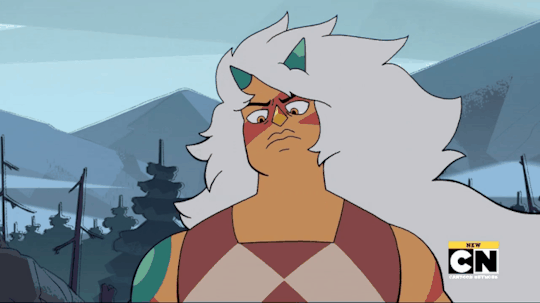
She's also the opposite of Steven in one way because she tells Amethyst "Fighting is my life!" And Steven Universe isn't much of a fighter more like a pacifist.
So yeah that's really why I love Jasper and why she's my favorite antagonist in Steven Universe as a whole...but there is one thing I will say that I don't really like.
I don't like the fact that Jasper was brought back from being shattered just to do nothing after she was shattered. It immediately removed the tension that Gems can be erased due to the fact that Steven was able to repair and revive Jasper hours after he shattered her.
It would've really been disturbing if they just kept Jasper shattered because not only is the danger of shattering still..dangerous, but it will also somewhat work thematically with Jasper's character. Jasper is the only gem who didn't change their violent tendencies from the start and because of that, Jasper's fate couldn't be changed after she was shattered. But then again SU Future also showed that Yellow Diamond was able to repair shattered gems so it's possible that Steven doesn't even need the essence of all the diamonds to repair a shattered gem.
Would I be sad if Jasper stayed dead? Definitely, but it was pretty underwhelming to see her again just not do anything after she was repaired but then again what could she have done when she was repaired? Y'know?
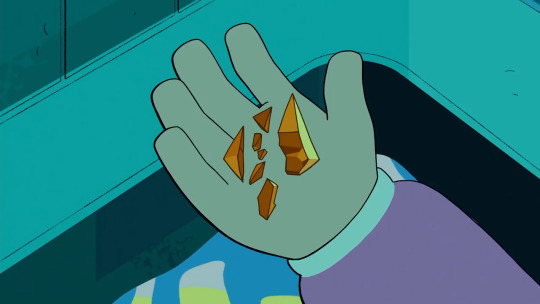
Anyway, that's all for today. Thank you all for reading and I hope you all have a nice day! ❤️
#steven universe#su#steven universe jasper#jasper#antagonist analysis#villain analysis#steven universe criticism#steven universe critique#jasper steven universe
131 notes
·
View notes
Text
ok so i just watched season one of korra and damn the way tarrlok in jail parallels ozai, and the whole noatak/tarrlok/yakone = zuko/azula/ozai but water tribe and similar sort of familial dynamics... i actually do not mind this at all hmm
My father is the worst man alive,and I am his favorite daughter.
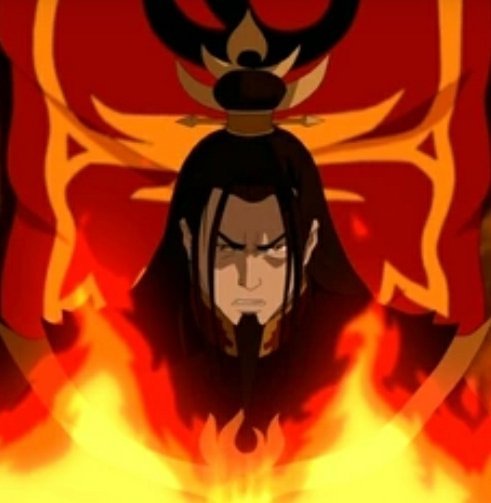
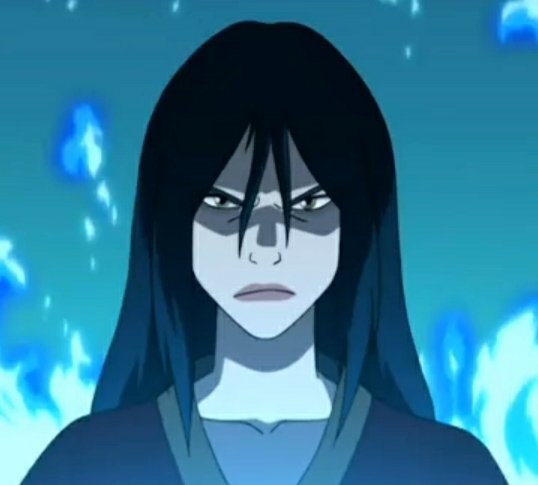
2K notes
·
View notes
Text
I've been thinking for a while about the optional Magatama dialogue in The Cosmic Turnabout where you can prompt Fulbright about what's bothering him, and for both of the wrong answers, he acts like you got it right, and actively leans into the bit. For example, if you suggest that he's exhausted by life, he agrees and claims he's thinking about quitting his job and going to space. (Honestly, mood.)

(AA 5-4 and 5-5 spoilers below the cut)
It's a good line on its own: funny, and definitely relatable. With 5-5's context, though, it brushes up against a deep-seated desire to disappear, to run away and start over, something the Phantom hasn't been at liberty to do in years. He's shackled to a seven-year-old assignment, strangled by loose ends that he can't tie off. For maybe the first time in his life, he has to wake up every day and live with the effects of his actions, made blisteringly real in the form of the people he hurt.
(Do I think he's walking around harboring deep, profound remorse for UR-1? Not really, no. But the self-protective lie of "my choices don't matter because I'm not really a person" only goes so far when you're clocking into work every day to hang out with the guy who's on death row because of you, who's grieving because of you, and suddenly you're the only person he trusts to hear about the monster that ruined his life, and you planned for this but you didn't plan for this and honestly at that point I'd want to quit my job and throw myself into the vast expanse of space, too.)
Also worth noting, during this entire scene, any time Fulbright goes to answer a question or make an assertion about himself, the tinted glasses go up like a shield. Eyes hidden, hand obscuring the lower half of his face. It's something he does pretty regularly throughout the game, but it's egregious here. My man is on the defensive and he's giving absolutely zero ground.
But the big thing for me is the other "wrong" option, where if you claim that Fulbright is troubled by love, the Phantom's knee-jerk "yes, and," response is to tell a story about a carp named Love who ate a bunch of goldfish because he put them all in the same tank.


In the moment it's supposed to be absurd and comical and one more example of how hapless this guy is, but in retrospect, it's kind of telling that when the Phantom tries to conceptualize love in relation to himself, the first piece of Fulbright-flavored bullshit that comes to mind is about a creature that brings pain and death through mere proximity, not out of malice, but out of nature. As though, subconsciously, he's fixated on the notion of a foreign element that's been dropped into an otherwise peaceful space. A fish that seems like it belongs there until it devours the others.
He really could have said anything—he could have made up a story about a bad breakup, or a really sad movie, or a family member who died. He could have jumped to talking about Blackquill, and how he's concerned for his emotional state given the nature of the current case. But instead, his mind instinctively gravitates to a Love that consumes everything around it: a Love defined by its capacity for violence. There was never a world where the carp could exist alongside the goldfish without hurting them.
And idk. I feel like if he wasn't feeling some kind of way about that, then it wouldn't be bleeding into his Olympic-level improv gymnastics routine to convince Phoenix that he doesn't have any secrets and you can put the supernatural lie detector away now, thanks.
#ace attorney#aa5#aa5 spoilers#dual destinies#bobby fulbright#aa phantom#character analysis#meta#remember when i said i had more serious thoughts about this guy? at last i am here to deliver#look. if capcom didn't want me to psychoanalyze all of the phantom's sillygoofy fulbrightisms#then they shouldn't have made him the main antagonist of lawyer game: analytical psychology edition#the whole point of his breakdown in 5-5 is that he's a person and it terrifies him!!! and you expect me not to think about that????#anyway this post brought to you by the generous peer review of homicidal-lingonberry#who got to listen to me ramble about this in dms first
268 notes
·
View notes
Text
Jimmy and Swansea at Their Worst
The crash of the Tulpar sees Jimmy thrust into a leadership role for which he was hopelessly unprepared, and in the months that follow, his chain of poor decisions leads to dire consequences for all those aboard, himself included. But he wasn't alone in that marathon to rock bottom. If we follow his footsteps downward, we'll find Swansea's right there next to his.
At the surface level, the two already have a lot in common. They're both brash to the point of rudeness, openly dissatisfied with their lives, and have short fuses.
Notably, Swansea can also be overly critical of Anya.

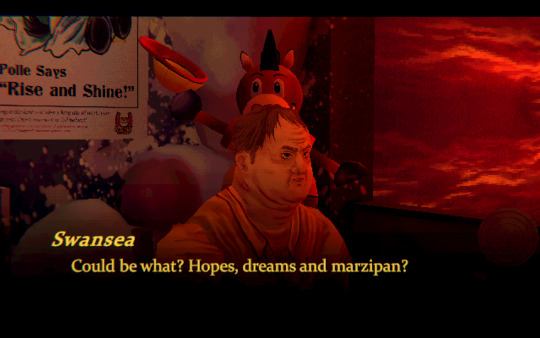
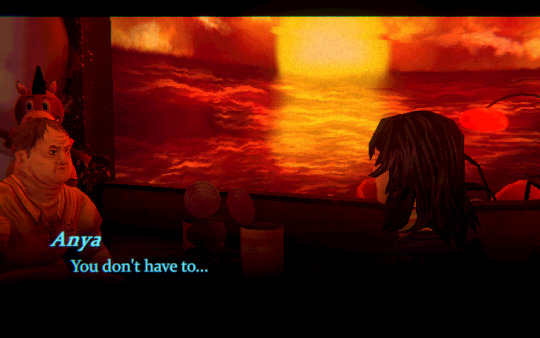
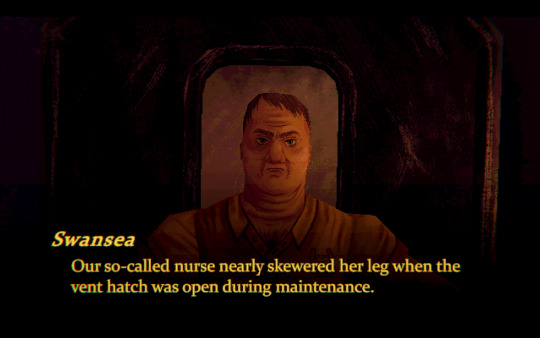
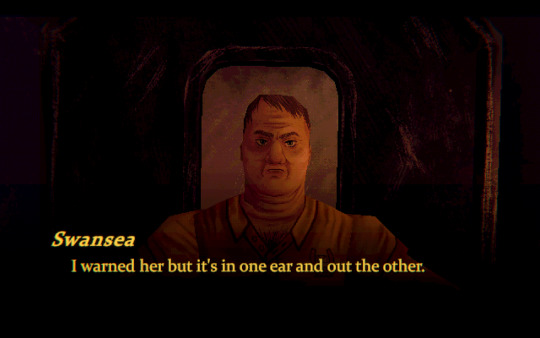
...But, to be fair to him, he's like that with everyone.
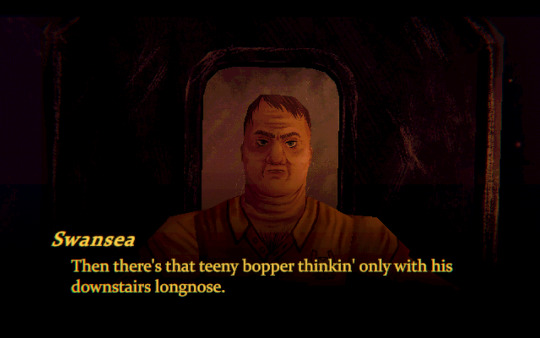
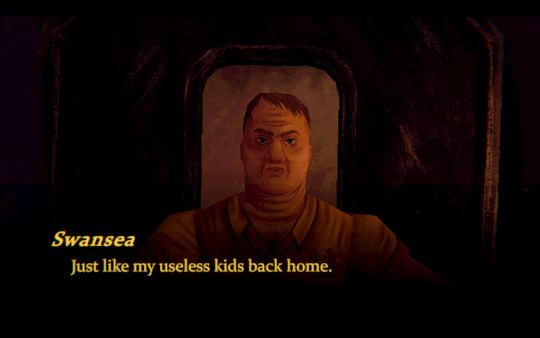
When they really start to converge is after the crash. Looking at Swansea's relationship with Daisuke, it's almost a microcosm of Jimmy's relationship with the crew. While he initially makes an effort to do the right thing, he inevitably gives in to his worst impulses and fails. In Swansea's case, he falls off the wagon. This may look like only a personal weakness, especially compared to Jimmy's more outwardly destructive behaviour. But in his position, even the harm he does to himself reflects outward.
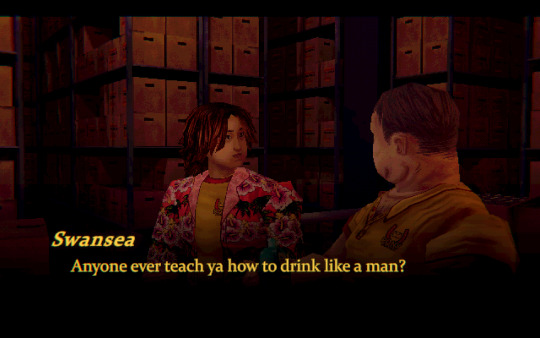
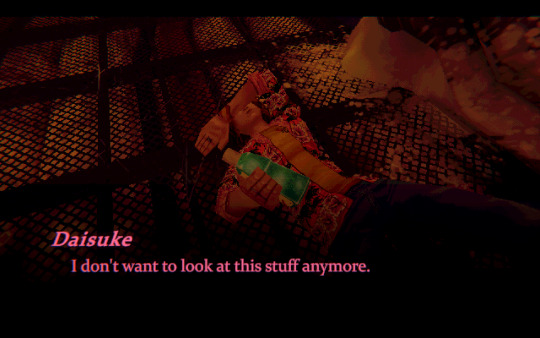
Daisuke is the only other member of the Tulpar that we see "indulging" in the mouthwash. Swansea has no idea that he's sprawled on the floor, sick on dental hygiene products, devoid of his characteristic cheer. If he did know, what could he even say? After all, Daisuke was only following his example.
Later on, Swansea's alcoholism prevents him from protecting Daisuke in a much more literal sense.
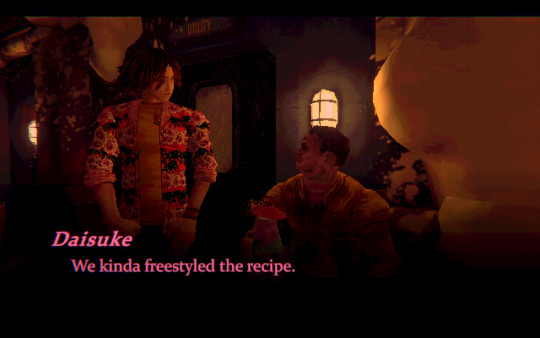
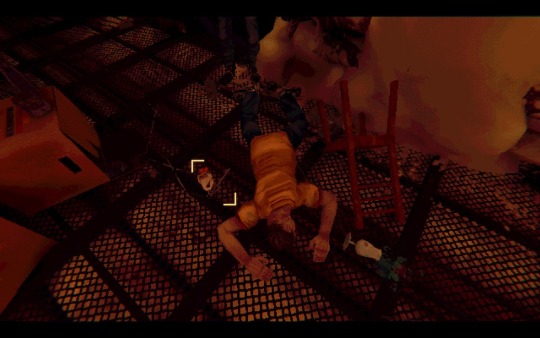
All his secrecy and isolation were for nothing.
One of the major reasons he withdrew from Daisuke was because Daisuke was much too naive to hide the cryopods from the others; he probably never would have accepted that everyone else would have to die for him to survive. Swansea took extreme measures to guard the Utility room from Jimmy, all to protect Daisuke. But in doing so, he gave Jimmy the perfect opportunity to take advantage of those very traits he wanted to protect.
In this moment, both Swansea and Jimmy fail Daisuke. They both let their weakness blind themselves to danger. And they both realize their mistakes far too late to save anyone.
But it's through this ugly truth that Swansea is able to break off from their path. With the last of his hope gone, he can do what Jimmy can't: he accepts it. And he does what he knows is right, even if it breaks him to do so.
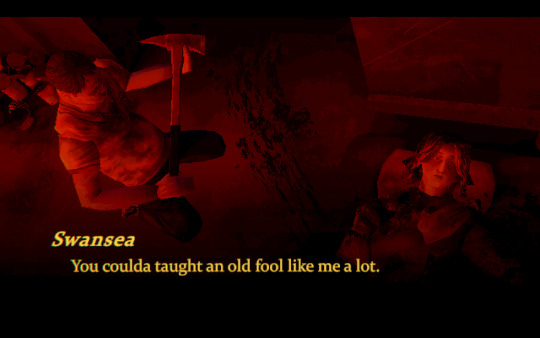


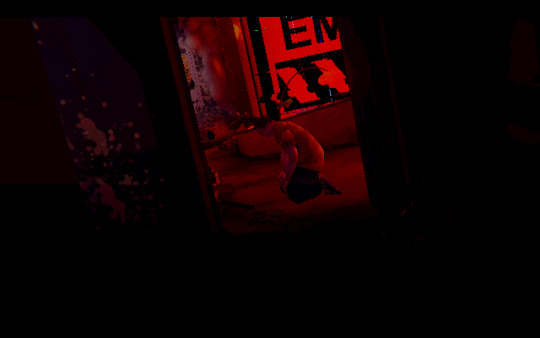
I think Swansea also sees some part of himself in Jimmy. Maybe even what he could have been if he didn't fight so hard against his demons. That's why in his final act, he tries one last time to get through to him. It was too late to make things right with his kids, or for Daisuke. Or even himself.
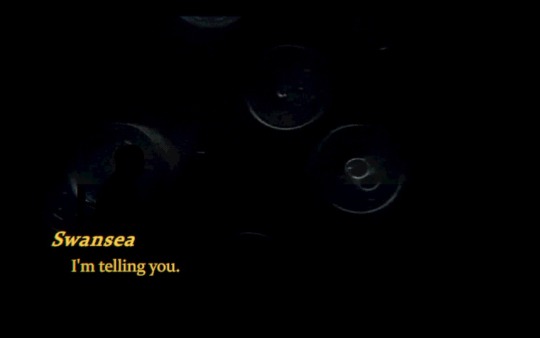
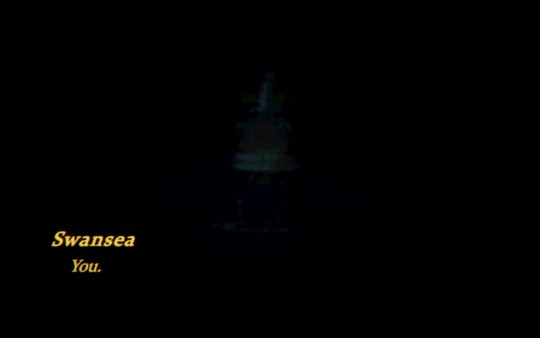
Of course, he knew it was futile. Jimmy was never going to listen. Because what really set them apart in the end was irreconcilable; the gulf between them was shaped by their ideals.
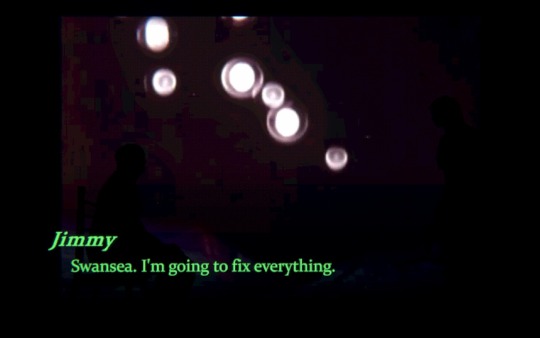
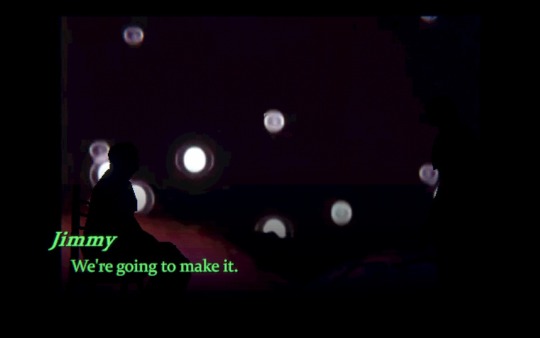
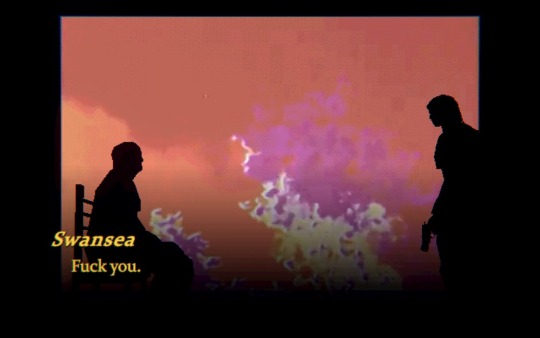
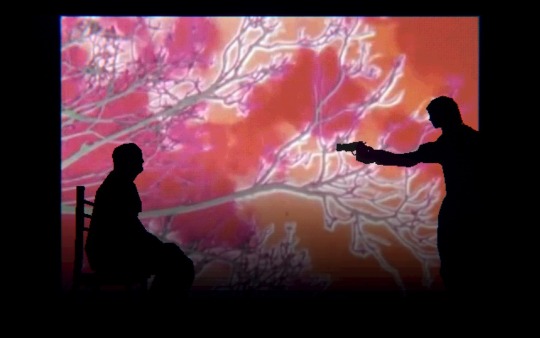
Swansea wanted to be a better man. Jimmy wanted to be a hero.
#mouthwashing#mouthwashing spoilers#swansea#jimmy mouthwash#analysis & discussion#long post#tbh i feel like most of the stuff i went over in this post has already been covered pretty well and by people better equipped to do so#but I've been thinking about how much they work as narrative foils for a while so i needed to get it out of my system#i just think it's interesting that Swansea acts as something like an antagonist for Jimmy
280 notes
·
View notes
Text
I get that in general a lot of kids shows do utilize the protagonists ('good guys') in ways where they're supposed to be role models, particularly because some do have a "lesson of the week" where the character does bad things, then clearly learns and explains what they should've done instead by the end of the episode.
That has just... never been how TDP has operated, and I don't get how and why people think we're supposed to take what anyone does in the show as being unilaterally good or evil. Particularly in arc 2; any moral simplicity that was hanging on by a thread in arc 1 has been taken out back and shot numerous times by now.
TDP very rarely calls anything Evil or Good, and when it does, it's always filtered through the characters' biases, and rarely does more then 2-3 characters ever have the same opinion on something for the same reasons. Soren and Rayla, who have inverted character arcs, are some of the only characters to ever use the term villain / good guys or bad guys, and are two of the most staunchly black-and-white thinking characters, heavily to their detriment, I might add, in terms of coping with the increasing complexity of their lives. They have cognitive biases. They're not always right, and are frequently wrong. This is true for everyone in the show.
The show refuses to condemn murder, indirectly and directly condemns the expulsion of humans from Xadia routinely (Evrkynd being a city for everyone, Ezran arguing with Karim, who is the most wrong about the most things), and shows a variety of viewpoints on all things.
The show understands that the choices people make—whether the same character trait is a flaw or a strength—as well as 'moral' choices are all circumstantial.
Are you wrong to burn people alive? Mostly yes (2x07, 6x08) but also no (3x09). Are you wrong to kill people? Sometimes yes, sometimes no, sometimes whether it's 'wrong' or 'right' doesn't even factor in. Are you wrong to use dark magic, or use the dangerous Staff of Ziard, or coin someone and condemn them to a 'fate worse than death'? Sometimes yes, sometimes no. Is lying or hiding the truth to protect someone wrong? Sometimes yes (1x06, 2x03, 3x03, 5x01, 7x04, 7x06) sometimes no (1x02, 2x03, 6x06, 5x08, 7x08).
Are you doing the right thing?






Do you have no choice? Is that true, or is that just what you think, or how you rationalize it yourself?






When is it right or cowardly to leave (Viren, Lissa, Rayla, Callum, Ezran, the Cosmic Council, the offer made to Karim's troops)? When should you stay? When do you decide to share resources (2x05) to your potential detriment or withhold them in the name of protecting yourself and your own people (Xadia and magic)? At what point(s) do you prioritize your own pain and grief, or someone else's (i.e. the Keeper vs Callum vs Ezran)? At what point is someone too dangerous or 'too far gone' to keep alive (Runaan about Harrow, Ezran about Aaravos)? At what point do you decide someone cannot change? When do you refuse to change (Karim, Terry) who you are no matter what happens, and when do you decide that you must (Ezran, Soren)? When is it wrong to use illusions to trick someone (3x09 and 7x06) and when is it more reasonable (2x03)? When should you be willing to sacrifice others (Rayla with her family, Runaan and Rayla with Callum, Soren with Viren) and when should you refuse? When should you sacrifice yourself, and when it is wrong to? Did you betray them, or did they betray you, or both (usually both)? When should you betray or stay loyal to your family? What is the right thing to do?
The show, tbh, doesn't know, at least 90% of the time. It's not interested in knowing. It's interested in exploring. That's the whole point. At most, it says you should work towards harm reduction, but what constitutes harm, and what peace looks like, is also something that greatly differs for all the characters.
Rayla is willing to sacrifice the love of her life, Ezran is willing to create weapons of mass destruction and wield one, and Callum used a torture spell on someone when he absolutely did not have to. The idea that any of the protagonists are meant to be paragons of unblemished virtue who are always 100% right, or that any of the antagonists do not canonically have a good point of contention with anything that's happened and are always 100% wrong, is reductive to everything the show is and explores, because it is Quite Literally not what the show does, ever tbh.




They literally spelled it out this past season as a core theme; I don't think they needed to have a character directly point it out every time a main character did something that was Kinda Fucked Up or Complicated But Understandable to know that the show knows it was Canonically Fucked Up or Complicated But Understandable.














There is not a single character or action in TDP that is always right, and there is not a singular character or action in TDP that is always wrong. Hell, even narrowing it down to "this is 'right' or 'wrong'" feels counterintuitive because it's so subjective within the narrative.
Every choice the characters make is often well reasoned, aligns with their values and world views, and fits into how they work through problems. Every choice has benefits and consequences, for them or for others. That doesn't mean it's Right for everyone involved. That doesn't mean it's Wrong for everyone involved. That's what makes the show interesting. Everything has nuance. Everything has Complexity. I'm not interested in a simplified version of TDP. I'm interested in the show as is.
I hope you are, too.
#tdp#the dragon prince#analysis series#analysis#mine#im so tired#s7 spoilers#like i truly cannot fathom watching viren walk away from claudia or the illusion plan in 7x06 and thinking#'the show wants us to think this was 100% the right thing to do no ifs ands or buts' like. what#like rayla thematically has always been an antagonist#it just always seems like ppl are like. the show doesn't know the magic system is unfair#or the cosmic council are gonna be good guys. and it's like. the show has known the magic system is unfair since s2#that's the point of s2. the cosmic council will be dismantled. they have to be. that's why they're there#it's a hand of god narrative structure. they executed a child for no reason. where else would we go#have a lil faith#'humans can do whatever they want bc they were oppressed' that's not how life & morality works#just look at world affairs (atrocities in gaza)
195 notes
·
View notes
Text
How Fairy Tail could have had a really cool thematic parallel if they Committed to the Bit:
I often joke about my constant urge to spew essays on characters and topics I have thought too much about, but I refrain because translating all the thoughts in my head to words takes time and effort, and sometimes I am speaking to the void. However. I am spinning in my chair, gnawing at the bars of my enclosure, and frankly thinking way too much right now so I must scream.
It would have been so impactful if Fairy Tail emphasized Jellal being brainwashed.
Jellal is my boy, of course, but I’m not even just talking about the impact to his character: I mean the impact of the entire plot. This, of course, if we went the whole mile with the theming. The machination of being controlled, emotionally or magically influenced, or even unable to fulfill a desire due to an insurmountable obstacle, comes up numerous times throughout the plot, to both primary characters, supporting characters, and antagonists. While Fairy Tail is absolutely a series about friendship, it is also about choosing your path, with a large recurring theme of, regardless of connotation, about being selfish, and what that means on both ends of the spectrum. It’s a matter of free will, and the antithesis to this is all manner of external control. So really, it makes sense that this should be a thoroughly explored theme.
I could talk all day about all the different examples and aspects of this but I came here to talk about Jellal. First, the slavery aspect really hits the nail on the head, so we’re off to a great start—this, of course, applicable to multiple characters, which I really enjoy. Things go wild, however, when Jellal effectively chooses to trade himself for Erza in the punishment game and gets the ever-living shit beat out of him at the ripe age of eleven or twelve years old. He is, understandably, not in a good place, and he comes to the stunning conclusion that… he hates the slavers. Yeah. Checks out. Then, he hears the voice of ‘Zeref’ spewing rhetoric about hate, and it overwhelms; this, we know in hindsight especially, to be Ultear casting a mind-fuck spell in order to manipulate him, under the guise of pretending to be a figure young Jellal believed to be a god.
When I first saw this flashback, watching the anime, I was unbelievably hyped. For all of Fairy Tail’s odd relationship with foreshadowing, I got the gist of it as soon as the magic went into his right eye and overwhelmed him. In Japanese media especially (largely due to the prevailing symbolism of the daruma doll), the right eye is a huge indicator of free will and the future—namely one’s goals. Creepy magic ghost entering the right eye with magic-bind looking things and immediately warping Jellal’s goal? A+ delivery. Of course, at the time Zeref—an unrevealed ‘evil’ entity—seemed a likely culprit, but Ultear being the puppeteer changes little of the result. In fact, it actually creates a super interesting parallel, but more on that later.
First, there are the consequences of Jellal being an antagonist who is not in control of his actions. I see people lament that it “cheapens” the severity of the arc and provides a cop-out redemption for Jellal, and while the execution of the latter certainly could have been different, I don’t think the premise of mind alteration cheapens the overall plot and theme of Fairy Tail at all; on the contrary, it could have been used to further emphasize intra- and inter- character conflict as well as provide a super engaging parallel for the end of the series. The theme of nakama, family, and friendship is huge, so what better way to emphasize that than to show a twisted example of it?
Jellal goes from ride-or-die loyal and ‘good’ to circumstantially loyal to an ideal (and the people attached to it) and ‘evil’ with the flip of a magic switch. Erza gets the immediate short of the stick when she is the first victim (aside from Jellal himself) to this meddling, and the caring friend she had seen days or weeks before is now cruel, insane, and full of threats—threats she takes heed to as she is cast from the island. Now, Erza is also a child, and one full of trauma, so I am not trying to invalidate her fear or blame her for any outcome. This also does not dive into the intricacies of saving friends at cost to oneself, and all of the conflict thereof; if anything, the complication of the matter bolsters the drama and impact. And then, we have the rest of the squad. Sho, Wally, and Milliana buy into the idea without any trouble, and they continue to buy into it as they get older. Beyond morality, it’s a power fantasy, and those are easy for formerly powerless people to latch onto. However, Simon is the only one who realizes that something is fundamentally wrong and twisted with Jellal… and his ultimate goal, developed over the course of roughly seven to eight years, is to wait it out until he finds the opportunity to kill him, or get somebody else to do it. Ultear, even after integrating herself into the group out of nowhere, gets away with her plan, because ultimately nobody questions that Jellal’s sudden change was anything but a result of trauma and his own will—even in a world with magic, where the very first arc revolves around the use and mistreatment of charm magic.
(Now, as an aside, I unfortunately have some experience in friends suddenly changing. In real life, it is rarely so sudden and obvious, of course, and the culprit is usually those horrible little signals and hormones within the mind, and nothing so fanciful or external as magic. I had a friend take a nosedive into some truly batshit ideas—cult-starting worthy—and exhibit wild mood swings and displays of unprecedented behavior. It admittedly took me a moment to ascertain it among the known issues, but once the pieces clicked, it clicked. I wished I had noticed sooner, and even though she was more culpable of her choices than a person supernaturally influenced by an outside force, I still can’t hate her for all the harm done. This is all just to say that I have, especially in recent years, a personal perspective on this trope and an appreciation for the painful nuance.)
Refusing to reveal this mindfuckery in the arc diminishes the severity of it a great deal, I fear. We, along with the characters, spend time believing he died an insane villain… and then when he comes back amnesiac, it softens his character but does nothing to contradict how awful he had been. It’s not until years later, arcs later, that we get this random instance of the long overdue reveal to tell us that the manipulation has been discovered off screen. Not only is this utterly underwhelming, but Jellal is now actively working with Ultear and is fine with it! He’s still (understandably, after all this damn time thinking otherwise) blaming himself and lighting his own pyre to atone for things started by a factor completely outside of his control, and every character lets him. The discussion of autonomy is wasted. So, too, is all the juicy emotional fallout. We don’t see Jellal grapple with the horrifying reality that he has not been himself, that years of his life were wasted as a mental slave instead of a physical one; we don’t see Erza beat herself up (likely unnecessarily) because she could have potentially protected him but she hadn’t out of fear, and then she condemned him unknowingly; we don’t see the others truly come to terms with the fact that Jellal had been stolen from under their noses and they never noticed; we don’t even get more than a glimpse in Ultear’s head, who committed the deed because she thought her means wouldn’t matter and then they did.
It’s horrifying. It’s tragic. It was, perhaps, preventable—in that the problem was a punchable one, to a degree—except the people involved were just children, just human, and it wasn’t enough. Friendship and flashy magic power could not trump trauma and entrapment, not this time. No matter how I think the series could have and should have handled it (and I have several ideas, of course), Jellal’s story provides a haunting case of failure regarding the themes of friendship/community and freedom that our protagonists embody.
Which brings me to the perfect opportunity to follow up this occurrence of stripped autonomy and loss of freedom with a culmination of the affected themes, plot points, and more: the books of Zeref.
Namely, the idea that the etherious—sapient, cognizant, and fully capable of autonomy via every depiction given of them, from Tartaros to even Lullaby to especially Natsu—can be and have been resolutely manipulated and controlled via the books by Zeref. Now Zeref, infamously hands-off up until the finale, barely utilized this. The most we ever see is instilling a directive and supernatural need to kill Zeref in the texts, which serves as an externally imposed goal. (Sound familiar, yet?) Provided Larcade clearly doesn’t have these instincts, it is not a guaranteed addition either, which further adds to the sense of deliberation. Natsu experiences this only in the last arc, in what I assume is supposed to be a very tense and jarring plot of a friend and protagonist suddenly losing himself, but it does not get expounded on for long enough to hammer the point home. The plot point of reclaiming the book becomes about saving his life only, and not his autonomy. Not only could this have been emphasized to be properly horrifying and devastating, but the effect—and the suspense—would be doubled with the prior establishment of Jellal’s arc and the tragedy therein.
To back up for a moment, this parallel is further accentuated by the fact that Ultear and Zeref are clear mirrors of each other. Ultear was afflicted by a magic condition outside of her control and she was enslaved as a lab rat for it. When she broke free, she perceived her mother to have abandoned her, so Ultear, in her unresolved anger and grief, aims her entire goal to rectifying it, which culminated in planning to undo the entire timeline in order to make the one she wanted all along. Any casualties, any cruelties—including the mental enslavement of a slave child—are means to an end, and will ultimately be forgotten. Zeref lost his entire family to tragedy, and in his grief, he refused to forfeit the idea of regaining what was lost, namely his brother. He became afflicted with a curse—a magic condition outside of his control—and experienced cognitive dissonance for it. Ultimately, this miserable existence culminated in the idea of erasing the timeline entirely and forging his own. Any casualties, any cruelties—including subjecting his creations to the same lack of complete cognitive control—are means to an end, and will not matter.
I mentioned that selfishness is also a recurring theme and this is a prime example of the dark side of it. For Lucy, claiming her independence and following her own path against the wishes of her estate, it is a wondrous thing. Freedom cannot be achieved without some selfishness, and this is a wonderfully handled theme in Fairy Tail, where our protagonists unabashedly put their friends above concrete morals and follow a creed to live their life to the fullest—the eternal adventure. For characters like Ultear and Zeref, their personal desires—born of horrible tragedy and frankly understandable things to want—come at the cost of the autonomy of everyone else, especially the pawns they use to further their goal. This, in true fictional hyperbole, begs the question of where the line in the sand is to be drawn, of what is acceptable on a moral standard and what is not. It is, of course, colored by the protagonist’s point of view as clear antagonism, but as a viewer of the media it provides to us to question when protecting one’s ideal becomes irrevocably an attack on the sanctity of others.
Which brings us back to the matter of the books. The intended horror of Natsu losing control of himself, I think, could have been really emphasized in order to highlight these aforementioned themes. Imagine if, instead of a complete menagerie of new characters as the final invading force, Zeref’s key piece of his invasion was Natsu. With the intended goal of undoing time, having Natsu kill him is no longer necessary, so it would be more pragmatic to use Natsu instead as a weapon of mass destruction for his goal. Not only is he inside of Fairy Tail, but Zeref is, theoretically, doing this for Natsu too, and he won’t remember this upon success—nevermind that the Natsu we know, that presently exists, that we have watched develop over the entirety of the series, would be forever erased regardless.
Armed with the knowledge of what happened to Jellal, and how he ultimately had no one to intervene for him, this increases the urgency within the characters and will likely expedite their discovery of why Natsu turned against them out of nowhere. This time, a resistance is launched, and characters have the chance to intervene on the behalf of a friend. Gray couldn’t save Ur, Lucy spent years ensnared by the will of a family member, Erza didn’t recognize Jellal’s plight until it was too late, but they can save Natsu, and save him quickly. Fairy Tail, Team Natsu especially, can rewrite the book of E.N.D. solely for the great cause of freeing their friend and handing him back his free will, and in the process, Fairy Tail saves their own future as well. This doesn’t preclude the ability to free Zeref from his curse, but with or without that we have a beautiful culmination of fighting for the sake of a friend, for the individual and for the whole group. This time, friendship wins.
I just think it could have been really cool.
#fairy tail#pencil essay#pencil rambles#jellal fernandes#jellal fernandez#yall this why i usually only threaten to write essays#this is 2k worth of essay I banged out in less than 24 hours like a madwoman#couldn't even sleep well last night I was just Thinking about it#ruminating if you will#there are sooooo many finer points I left out of this for the sake of streamlining#like my separate analysis essay on ultear in particular#and how hades plays into it etc etc#she was such a cool antagonist#and of course I think about how I would have resolved jellal's thing#ranging from most tragic (death or incarceration) to most friendly (we adopt him)#but that's also a different can of worms#i can't even apply all of this to htryds because the specific ship has sailed for the natsu plot#even though i am absolutely harping on the jellal bit#and those sweet sweet themes of freedom and autonomy#some of my favorite themes which is why i love characters who get it taken from them#nobody will be surprised i love the winter soldier for example#juicy stuff#anyways i already subjected yall to my rambles i will stop in the tags#as i quell the AP Lit-caliber essayist ignited within me
106 notes
·
View notes
Text
Gonna post a Roger character analysis soon 🔥🔥 I want to make it easier for others to understand his character better and he isn’t just “evil” and shows several other characteristics
#he is my favorite character besides Jack#I love both of my evil sons#I mean evil as in they are antagonistic and not that it is their only trait#lotf#lotf fandom#lord of the flies#roger lord of the flies#lord of the flies roger#lotf roger#character analysis#certified yapper
56 notes
·
View notes
Text


tbh when i first watched monsters at work season 2 i was sad when johnny ended up being evil, bc i liked to think johnny put his rivalry with mike behind him and became a better person. like, i don't mind him being an antagonist, that was a given, but even though johnny was mean, idk he had standards? (other than the fact he was going to donate the funds from selling merch of OK's humiliation to charity like at least its for a good cause LOL) for instance, you can tell that ror values genuine skill, hard work and education, like when they reconsider sulley's placement in ror because of his dismissive attitude about his low grades, despite him being the image of a top scarer and being the son of a famous scarer

from this you can assume johnny also spent a lot of time studying and working fair and square to get good grades instead of trying to sail by, and that he wouldn't resort to cheating and got to his level through hard work and not solely his family name, unlike mu sulley initially
my point is that even though johnny did some bad things, he never did anything necessarily unfair to achieve his goals or win. even though johnny being an antagonist in maw wasn't a big surprise, i never saw him being randall boggs level of villainy. i will say he did a good job at being charismatic because even though he was an obvious antagonist and i knew it, i was still hoping he was a good person and became disappointed when his big plan was revealed
also this is really minor but i figured to just mention that there's a scene in s2 ep 10 where he gets carter's name wrong and calls him kenny, and when carter corrects him, johnny acts dissmissive and calls him carl, saying it wrong again and hardly acknowledging him. like he's shown to be charismatic and actually knowledgeable on knowing and caring about everyone's names beforehand, like he knows every employee he talks to at fear co, but now he's randomly being indifferent because, it was revealed he was a bad guy to just the audience and tylor? it's small but idk i thought i'd bring it up

what i found interesting about johnny sabotaging monsters inc and resorting to stealing laugh energy and claming it as fear co's is that to me, it didn't seem like something johnny (at least mu johnny) would do. however, it does seem like something mi randall would do
we already know that ror was a primary force into shaping randall's mindset and behavior in monsters university. and with johnny being the leader of ror and like the most popular guy on campus, i think it's fair to say johnny had a huge influence on randall during his uni years, which would cultivate into the personality he's known for in monsters inc

bringing it back to maw, perhaps johnny would first try to think of ideas to rival laugh power through improving scream, but randall would come up with ideas that would involve playing dirty and flat out sabotaging mi. this would've been great for johnny, to damage the reputation of laugh energy and improve the views on fear co., and would've doubled as giving randall an opportunity to get back at mike and sulley. i mean of course he would go the vengeful route
with randall constructing the scream extractor in mi, we know he's not shy to the idea of getting what he wants by unsavory means and at the detriment of others, and he could've pushed this mindset on johnny. maybe johnny's morals would've made him refuse at first; i like to think that he truly didn't want to go through with it wanting to do what he's ways done at the company and get things the honest way, but randall would've taunted him and pushed him to follow through with it, tempting him by saying that by doing this, he'd be protecting scaring, scream energy, and his family's legacy. despite what his conscience was saying, he had to for the sake of the company, a mindset similar to waternoose. with randall influencing his judgment to get what he wants, i think johnny would've been pressured to make the decision to follow through with this plan in order to save face
my point being: johnny influenced randall, and in return, randall influenced johnny


and they both suffered the consequences


#monsters inc#monsters university#monsters at work#randall boggs#johnny worthington#randy boggs#mi#mu#maw#pixar#disney#analysis#like antagonistic sure but him being at randall boggs level of villany ehh#but i understand he has a lot to live up to#disclaimer i wrote most of this over half a year ago after i just finished season 2
111 notes
·
View notes
Text
As someone who has always found antagonists to be incredibly compelling within a narrative, l've spent some time really looking into some of the elements the writers and developers used in the creation of Red Dead Redemption 2's antagonist Micah Bell.
One of the first things that stood out to me about Micah was the title of one of his main missions, "Blessed are the.... Meek?"
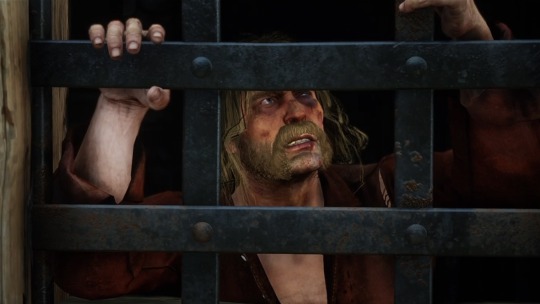
The naming of this quest is significant in several ways. First, it's a clear nod to the biblical verse Matthew 5:5, which reads:
"Blessed are the meek, for they will inherit the earth."
This verse implies that through gentleness, humility, and virtue one can be deserving and worthy of God's favor-in simpler terms: those who are righteous and good will receive a reward. They will win, in the end.
It's particularly interesting that this is the quest that gives us our first real solo interaction with Micah as a character, as well as setting the stage for future events in the story. From what we can tell of Micah thus far, he is anything but meek. Micah lives by his own rules, and shows little regard for others. He is the antithesis of gentleness-which is made abundantly clear as he thoughtlessly and impulsively ropes the player into shooting up half of Strawberry.

The quest title presents a level of irony and foreshadowing of Micah as a character. Micah is not meek, though in contrast one could argue that protagonist Arthur has many instances where he is the example of virtue and honor. By this logic, Arthur's honor should be rewarded, right?
However, that’s not what happens. Rather, at the conclusion of Arthur's arc we see him lose everything—his dreams, his family, and his own life. And we see Micah Bell walk away, alive…. in one of the most heartbreaking character endings in video game history.
Another interesting character design choice of Micah comes from classic western film tropes. In classic Westerns, the heroes were seen wearing white or light colored hats— in contrast, the villains were seen in dark colors, such as black. This was a simple technique used to signal to the audience who was good and who was bad in the story.
In Red Dead, we see a subversion of this trope. Arthur wears a black hat, and Micah (our antagonist) wears a white hat. This is a subtle foreshadowing that despite everything pointing to Micah being the villain, he may still be victorious in this story.
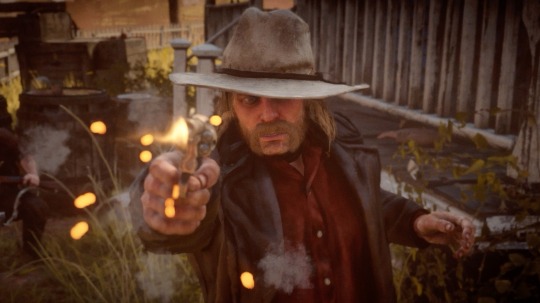
This example illustrates a theme that despite someone's virtue and honor, they may still suffer. Sometimes, justice does not prevail— at least not in the ways we expect. And while it is a tragedy, it is also a poignant exploration of what it means to be human.
#micah bell#rdr2#rdr2 micah#micah bell analysis#rdr2 analysis#blessed are the meek#biblical symbolism#revisionist western#short essay#antagonist
36 notes
·
View notes
Text
Unfortunately the trend of me getting emotional over Axel Åhman’s bad-people characters continues. Anyway I’ve been tossing around in my mind today how, as fucked up as their relationship is and how Kurt seems to be incapable of having healthy relationships in general, Kurt genuinely does seem to love and value Josua — Ässol is spinning off of the critique he accidentally reads in Josua’s diary, where one word in one sentence strikes him so much that it becomes the core of his emotional redemption ballad despite him never using it or even language like it before in the show (as opposed to Josua for whom “ässol” seems to be his insult of choice), therefore the thought probably comes from seeing it in Josua’s diary and not his own mind. Furthermore, at the end of the first part of his nightmare sequence, the one sentence that acts as such a bomb that it’s given the weight of a) being the last sentence in the sequence b) pushing the scene forward to become Ässol c) having a Dramatic Sound Effect afterwards isn’t the other characters calling him “klein” Kurt, a term given previous narrative weight through its repeated occurrences that therefore is an understandable moment to give the Big Effect of being the last moment, nor is it “I am a penis”, which is the moment where Kurt’s at his lowest point dignity-wise in a state that’s clearly the opposite of how he’s tried to present himself the whole musical, but rather “you’re not my dad”, a moment that centres on nothing but him and Josua’s relationship, and how badly it’s been hurt by Kurt’s behaviour. He’s made countless mistakes as a father and has driven his son away so drastically he doesn’t know if they’ll never have a familial relationship again, but on a deep level he cares even more about what Josua thinks of him than everyone else, and by Gunilla God he genuinely loves that kid
#thank you KAJ for nuance thank you KAJ for fucked up familial relationships thank you KAJ for depictions of unhealthy relationships where#love is still present#thank you KAJ for Gambämark tbh#to address the beginning also:#Bertel is really not That bad all things considered (but also we mainly see him as a friend in BP and he’s definitely a better friend than#he is a husband)#and either way Kurt is definitely worse on account of the whole dictator thing#but unfortunately there’s no other way to band them together cause Bertel isn’t an antagonist or villain and Kurt is way more than a sleaze#og#kurt byman#josua byman#indirectly#gambämark#kaj#analysis
28 notes
·
View notes
Text
let's talk about: Husk
Husk is a character that I see a lot of love for, but not a lot of discussion about, at least not the same way we talk about Angel Dust or Alastor, so I'd like to start the conversation since I've noticed certain details about him during a rewatch.
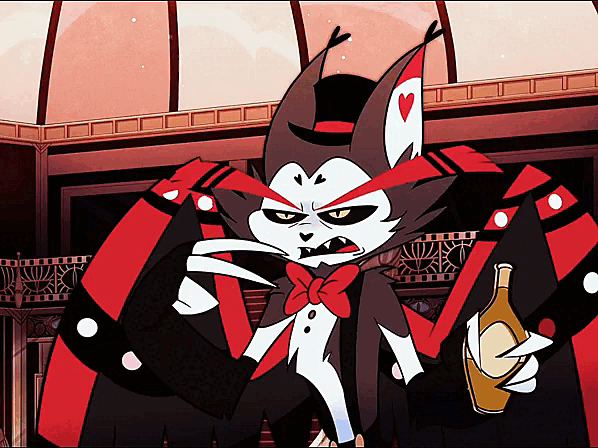
How He Socializes
Husk puts it best himself; "Everybody likes to bitch to the bartender." He knows more about everyone than anyone else, whether they tell him or not. Not only is he the one people turn to vent to at their lowest, he has incredible skill at reading others. It's most likely something he picked up as a gambler, but we can see he still utilizes it to read the other residents, like knowing Angel shouldn't be getting drunk after his long shift and realizing when he's masking right afterwards.
On the other hand, reading people like this doesn't seem to fit with his character in earlier episodes. In the first episodes, Husk makes it very clear he doesn't want to at the hotel and by extension doesn't want to be around the residents. His first line is literally about how he's forced to be there and pretty much all of his screen time is spent being anywhere from unfriendly to outright aggressive towards the rest of the cast. He surely doesn't care enough to read people to get closer to them, so why does he? I believe it's either a subconscious behavior or possibly as a defensive measure. Like in a poker game, he reads his "opponents" to stay ahead of them while keeping his own cards close to his chest.
It's already clear Husk values his boundaries when watching his earlier interactions with Angel, but this combined with other behaviors makes me think he's a very defensive person in general. His body language is constantly closed off, often crossing his arms or physically being separated from others behind the bar. This could just be indicative of his surly personality, but there is a specific behavior makes me think more of it. During my rewatch for this post, I realized Husk has a tendency to hug himself during certain moments of discomfort, like the entire first trust exercise in episode 3(more on that later), and during his first argument with Angel in episode 4, he actually shields himself with his wings when AD insults him before leaving.
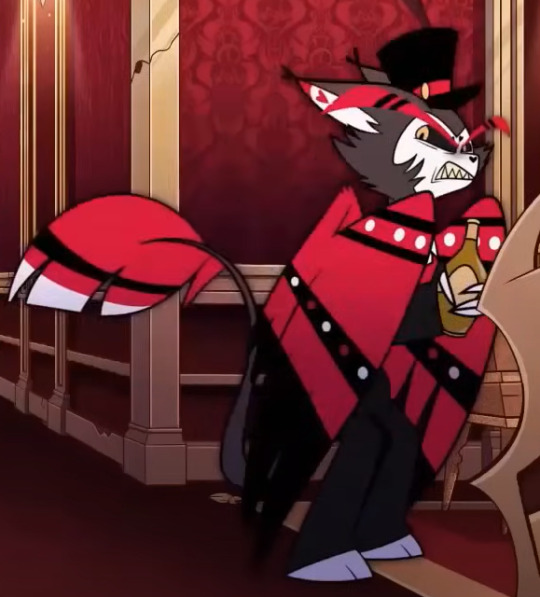
Speaking of, episode 4 is really a great example of how Husk view others, especially since this is when his mindset finally shifts.
It's easy to see how dismissive Husk is of AD during this episode, with his constant reiterations of how "fake" he is and even saying that he'll be fine after running out despite knowing that he's had a hard night. Looking a little closer at his mannerisms though, it's clear that he cares more than he wants to let on. He insults the scripts and setting of AD's video rather than his acting and even says that that's specifically what Angel tends to complain about. Even when Valentino sudden calls up AD, Husk's face is more upset than "I told ya so." He realizes that Angel is unhappy with his work, but at the same time, he doesn't think too deeply about it.
Husk assumes that because everyone tends to spills their guts to him while drinking, he knows all he needs to about them, and he's correct to a certain degree; however, despite everything he knows, he doesn't appear to think too deeply beyond what he can easily glean. Charlie wants to help others so she doesn't have to help herself, Vaggie projects her self-hatred and high standards onto those around her, and Angel bullshits his way through everything because he's an actor who doesn't know how to be real. Husk realizes these things easily, but not why the others are this way, and it especially shows during his confrontation with AD, as when Angel finally snaps and reveals his true motives, Husk is visually taken aback.
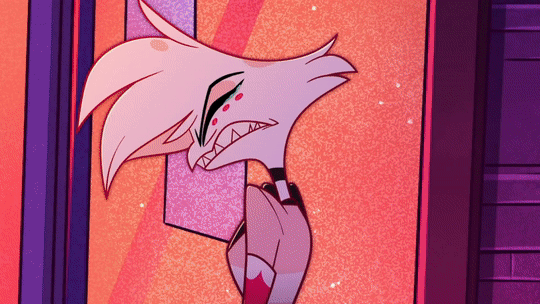
He's so used to knowing and analyzing people easily that this sudden, truly heartfelt moment from Angel makes him rethink how he's been going about their interactions, how he's been thinking of him this whole time. And this is the moment that makes him decide to open up about his own past. Whether it was seeing that common thread between himself and Angel or possibly a realization that he won't accept help from someone who doesn't offer any input of their own, this is the first time we really see him offer any of his private, personal life, and afterwards, there's an obvious shift in how he treats Angel and everyone else.
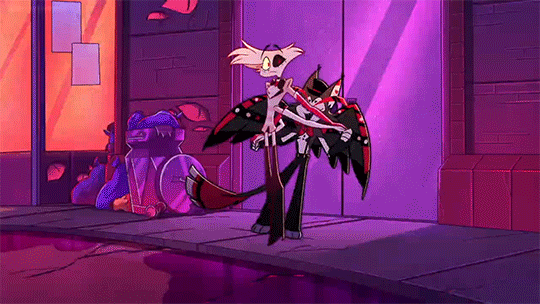
"Loser Baby" is the first time we see Husk willingly initiate physical contact onscreen when he's always be visibly tense and uncomfortable at even most mentions of it, though most of that was AD being suggestive so it could be an issue with sexual intimacy than physical. He's comfortable enough in episode 6 to go clubbing with the group and genuinely looks like he's enjoying himself, especially compared to when he went to keep an eye on Angel in episode 4, even helping look out for Niffty when needed and supporting Angel after standing up to Valentino. In the lead-up to the Extermination, there's not a single insinuation that he would've left the hotel, choice or not, and he is with the rest of the cast during all the important moments of the battle, from Sir Pentious' death to the ending number. Even when Alastor is presumed dead, even if he assumed Alastor wasn't really gone, Husk could've easily run off during his absence, but he sticks around to help rebuild, undeniably of his volition, wanting to help his friends and possible family.
That note also brings me to something I've really been wanting to talk about:
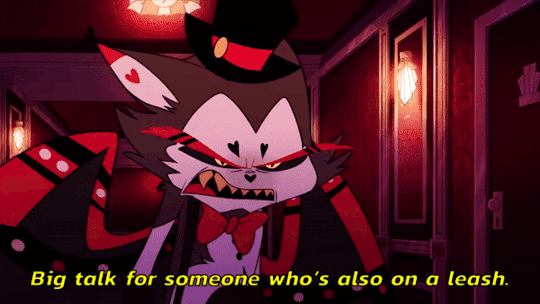
Husk and Alastor
Unless we see a shift or get new knowledge about Nifty, Alastor and Husk have a really unique relationship both in theory and as evidenced. Husk is a former Overlord, presumably from before Alastor's rise if he was willing to bet his soul in a game with him. This opens up a lot of questions for me, mainly about what their bet entailed, what led Husk to making it in the first place, and if there's a certain respect between them. Yes, Alastor refers to Husk as his "pet," but Husk also comes to him with his suspicions about Mimsy and it can almost be read as worry. Alastor even responds that "it's nothing [he] can't handle." There has to be a certain level of trust for someone to bring up "hey, that friend you've known for decades only ever comes to you when they need something" and have their concerns taken seriously, even if Alastor's care for others is negligible at best. This whole scene seems to be showing that despite their deal, their past as equals has not been totally forgotten by either of them, leading to a certain understanding of each other that neither, particularly Alastor, have had with anyone else up until now.
The biggest reason I bring their relationship up though is Alastor's deal. With all we've seen, I believe Husk is the one character besides Alastor himself and whoever the other party is that knows about the deal and its possible connection to Alastor's disappearance.
For one, Husk is the one that confirms Alastor is "on a leash" in the first place, and he shows no surprise that Husk knows. Alastor is definitely not the kind of person to let anyone know about something like that no matter how close they are, so this makes me think either Husk had to know or that he was possibly there during the deal.
It also stands out to me the specific phrasing that Husk and Alastor use during the scene.
"You've been gone a long time, and it's not like anybody knows why." "They don't need to know!"
This kind of phrasing makes it feel like Husk is specifically being excluded from that group by both himself and Alastor. If it's true that Alastor's deal is the reason he disappeared, then Husk knowing about both the deal and why Alastor's been gone lines up perfectly. Maybe Husk will be the one to reveal more about this to the audience or even the rest of the cast later on, but it's clear that he does know more than anyone not directly involved and at this moment is the most likely to talk about it, assuming Alastor doesn't immediately tear him a new one for it.
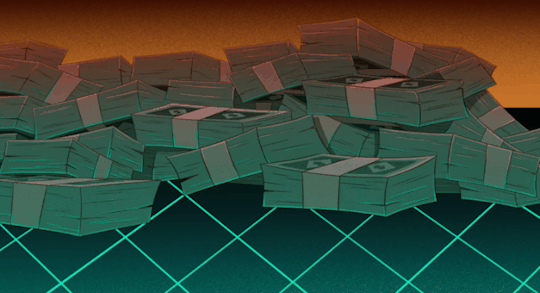
Little Details
Last section, I promise. This is just some little details I noticed while rewatching for this that didn't really fit in anywhere else and questions/speculation about them.
Remember how I mentioned Husk hugging himself earlier? The first time I noticed this was during episode 3 when, after seeing the stage, he declares "I'm not about to put on some show for these fucking chumps." Not sure how much of everyone's backstory is still canon, but it was stated that Husk was a magician during his life, so maybe this is hinting that he has some stage-related baggage?
Also during episode 3, we see Husk sneak down the stairs before Vaggie can toss him off the roof in the warzone, and since he didn't come back up with Angel and Pentious, he presumably left before they made it out. However, at the end of the episode, he's laughing with everyone over the events of it. He comments that SP can "take a beating like a champ" and "you did ok, new kid," so was he just pretending like he was there or did he just hang out on the sidelines and watch? Husk wtf?
Husk specifically says that AD's video is "not a very convincing interrogation scene." Does Husk have experience?
When the bartender pours drinks for the gangster getting Angel a refill, Husk immediately watches the drinks themselves, before the guy even reaches for that little bottle. He's a bartender, he's probably seen too many people have their drinks fucked with to the point it's just an instinct now.
He was ready to square tf up when Valentino hit Angel, but waited until Angel walked away instead of jumping in like in episode 4. He really does trust him to take care of himself and was ready to back up whatever he did.
During "The Show Must Go On," it's minor, but Husk actually tucks his wings around the group hug and it's aasfjkdsajfd
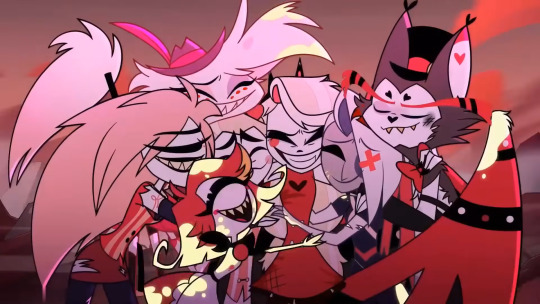
For those who've made it this far, thank you so much for listening to my overthinking and ramblings. Please feel free to ask about anything incoherent, add on to anything, or point out things I missed, I'd just really love to get the discussion started on some of these things!
#hazbin hotel#hazbin hotel husk#husker#hazbin husk#hazbin hotel analysis#hazbin hotel theory#also thinking about doing one of these for vox esp since he's supposed to be a major antagonist next season#but all that rewatching may lead to me getting very sick of my husband sooo(i say as tho i'm not fixated like he is on radio man)#holy shit haunt posts twice in one week(this is a rare occasion please do not expect things of me i will cry)/j
220 notes
·
View notes
Note
I keep seeing fanarts of ppl's OC's being on the ship, so do you think that if there was 6st crewmember (specifically, another woman) Anya would've been more safe? Like, someone to actually call Jimmy's begaviour out, someone Anya might wanna trust? Is there a possibility something might have changed (even if a little) or it would not have mattered at all?
-💀
I feel like the game would make it part of the commentary on where she would believe and help Anya but still be sort of dismissive? Like the whole “don’t waste time crying and being scared keep going and move on, don’t let him win”. It’s supposed to be positive and reinforcing but sometimes it does more damage in those times of mourning and grief, it feels patronizing, like you don’t understand what you’re going through but they do. Even if they did call out his behavior it’s still on Curly to act and while another voice would help, it’s still 4 against 2 on guys that don’t get it until they have to vs women who always have to.
I don’t mind mouthwashing OCs but I do get a bit bored as they tend to be borderline saviors or like Jimmy aligned. They are either more complicit than Curly or just Jimmy haters for no reason, outside of what the creators know about what he did to Anya. I am never irked by OCs but in a story like mouthwashing you really need to think about what your character adds to the commentary, especially if they are there during the crash. It’s nice to have like characters on Anya’s side more whole heartedly and interesting to see characters who placate Jimmy but sometimes it’s one note.
I can’t and don’t want to police peoples OCs it’s never my intention when I comment on trends I notice, but I do feel like the way people make their OCs interact with these two characters and especially Curly, really show a grave misunderstanding of the narrative and these characters as people vs roles in the story. Still, I know people just make up characters for fun and that’s fine. Great even, but I guys I’m focusing more on OCs that are supposed to have those serious dynamics. My favs tend to be pretty-Tulpar or post-Tulpar au OCs.
The inevitably of the crash is on Jimmy. He did that not because he wasn’t stopped but because all his means to kill Anya were taken. The gun, the axe. Even if Curly did strip him of his co-pilot privileges and try to keep him contained there’s only so many people. An extra body helps but they have jobs they have to do, he’s the only one steering the whole ship and Jimmy would likely have an out: food, bathroom, etc. He’s not new and if he couldn’t crash the ship directly, who’s to say he wouldn’t sabotage something else? A clunker like the Tulpar wouldn’t take much. An extra person helps but it’s just another thing that prolongs what a person like Jimmy is willing to do to shirk responsibility.
It’s more than just needing someone to stand up to him and think that’s what is missing when it comes to inserting a character into the mouthwashing setting.
#like again most people treat Jimmy like a misanthrope and he’s not and the way he’s just evil/rude to everyone all the time just isn’t real#like he’s snarky and rude but it can’t be 100% of the time like hes not going out his way to instigate#he’s the type to say shit and hope it stirs the pot like Daisuke likes him at first#thinks he’s a bit of a jerk but he likes him like unless you specifically make a character he’s dislike he’s not just gonna be#readily antagonistic to strangers or at the get go#not to mention it’s not just about Anya needing a friend but someone with the power to do something#a point in why she confides in Curly is he’s the captain she’s not just gonna tell the only other woman just because it’s still personal#not every girl tells their friend or another woman especially if they are new and they don’t know how they react not all girls are#girls girls some can be just as toxic as the men they are being confided in about#the nuance of the situation is not solved by having more people who actively hate jimmmy if anything it would make him escalate further as#clearly has issues with how people perceive him and being liked like another woman who hates him that’s gonna do something crazy in his mind#I think it’s interesting when OCs explore another side of the pre established dynamics as Jimmy uses each remaining crew member to fill a#something Curly provided for him and represent his dynamic with Anya and being an abuser I just feel like a lot is being missed out on#and it’s mainly cause people don’t want to make OCs that aren’t great people like it’s okay to have a grey mediocre OCs in situations like#this its realistic and helps you write more grounded characters like idk i like the ocs but eh im not like a super fan#I really should make an analysis on Jimmy cause people hate discussing him and his character is being really misunderstood#like not saying she’s innocent or an excuse but just not getting how he is supposed to work like he’s no dick fucking dasteredly#he’s a shitty guy who gets shittier like he ain’t start out an avengers level threat#mouthwashing#💀 anon#mouthwashing game#ask#anya mouthwashing#curly mouthwashing#jimmy mouthwashing#mouthwashing oc#now I gotta make an oc just to prove myself but I can’t draw#so maybe not cuz what’s the point if I can’t explain the fly drip
57 notes
·
View notes
Text
Let's talk about the clock keepers in the new chapter!!
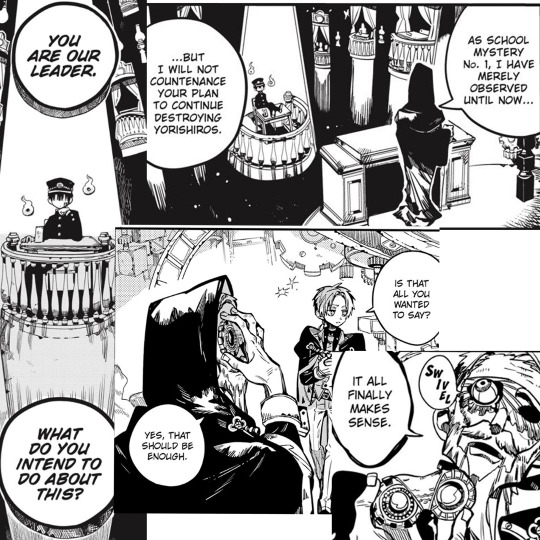
It's not a surprise to see that they had more in their sleeves, putting up an act to get all the information they wanted. Kako said it after all, he is the one observing. And he will gather what he needs before making a move, showing he deserves his title as the oldest supernatural. Hanako being the leader doesn’t seem to matter a lot to him in the end. He clearly has had his plan for a long time. It's not a shock to see he recognizes what came back with Tsukasa from the red house, probably knowing the entity from before.

Even if it was an act and all of them knew what the end result would be. The reactions Akane and Mirai had for each other in the last chapter were real. Akane was never shield in the manga, being the one doing it most of the time. So his reaction towards Mirai taking the blow for him is absolutely genuine, especially when he tried so hard to make her run away. And we can see it again when we see how slowly he takes her out of the water to give her back to Kako. Akane even reprimands the old man about being slow and Mirai having to go through this at first.
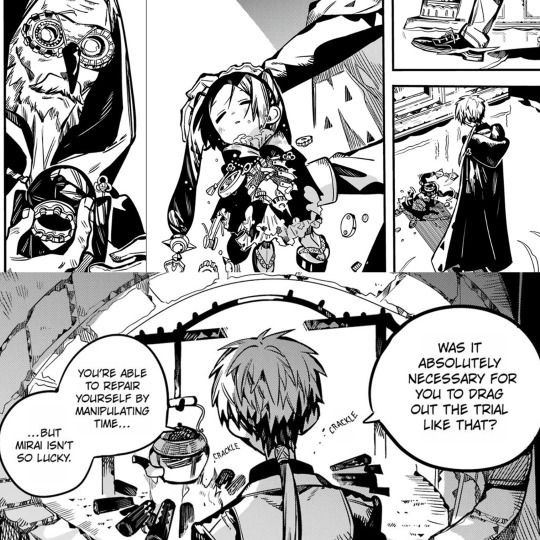
This chapter highlights the clock keepers relationship too. Akane has been before in the innermost reach, he clearly knows what he is doing here, entering the house like nothing and actually setting things up for tea knowing Kako would like it. Being considered as a whole clock keeper, Kako and Mirai trust him not to do anything bad even in their most vulnerable state.
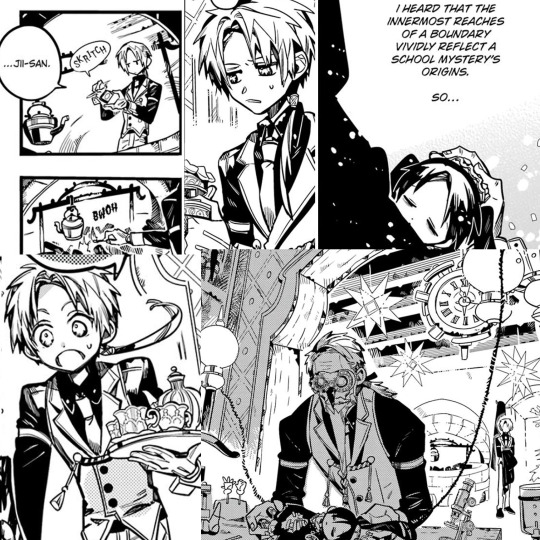
Kako watches over Mirai like a worried father, being happy when she is back and is still pushing Akane to find the answers himself, always in a teaching position. Akane is quick to scold Mirai about her actions, clearly seeing her more as a kid than a real supernatural being. He is seen worried for her and tells her right away not to do something like this ever again. On her side, Mirai is overjoyed to see Akane, the first question coming out of her mouth asking if he is hurt, and she seems rather shocked to see him being so worried about her, jumping on his head right away to praise him for being a nice boy.
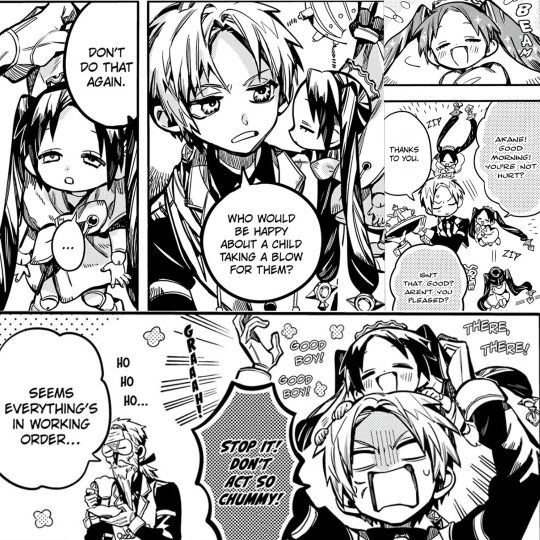
They are way more genuine in their physical contact and actions. Akane is not refusing Kako’s headpat even though he has an angry/solemn expression when accepting it, the old man is smiling at Mirai and Akane the whole chapter while Mirai is being her usual clingy self.
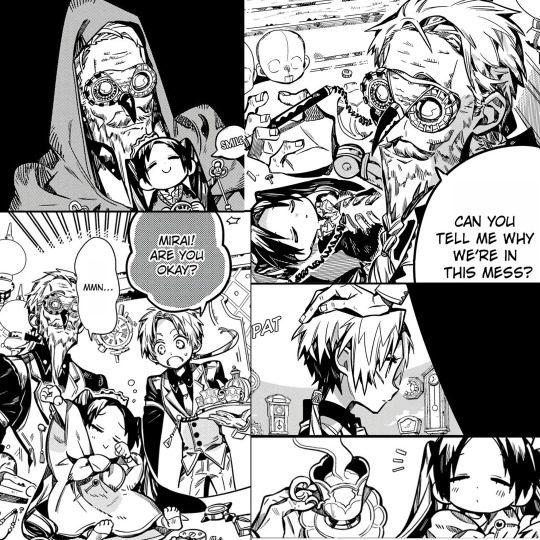
Kako clearly has been observing things and waited until the right moment to take actions. They are coming back in time to fix things up, and will sleep until the new present is stable. And for this they trust the clock keeper of the present to take care of the duty that was placed upon him.
Akane is a wonderful pick for the present. His personality and way of life has always shown he was the only character who would be able to handle this role. He is a duty centered and really proactive boy, and most of all, sees how life is worth living. Even if he never feared the idea of getting hurt, we can clearly see how much he takes his role at heart. He now knows he has to live if the idea of a better present can exist.

Kako knows Akane is able to handle all of it which is why they can leave without being worried about the new present, they absolutely believe Akane will be able to fulfill his duty. In the end, it’s Akane who keeps the yorishiro with him. They trust him to make sure everything is in order and not die until he can use the key to get them out of the clock once they awaken. Kako’s last word to Akane is once again one with a teaching tone, praising him for a job he will do, showing he thinks he will handle it.
One of Kako’s strongest traits is observation too. And Akane is really good at that, he is one of the most observant and perceptive characters of the whole cast. His mission will be all about seeing if the events really changed, acting like a memory of a present which doesn’t exist anymore. Having a human among the clock keepers to have eyes in the human world seems also like a logical choice. To know the whole situation Kako needs eyes in the human realm too, and Akane shares his informations with him when he think it's important.
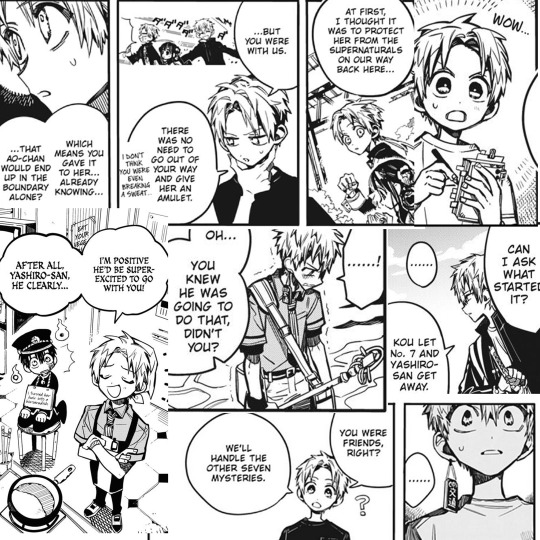
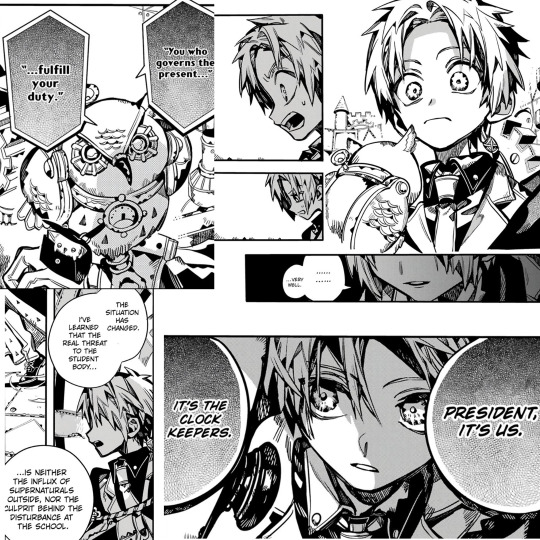
Akane has known his role for a long time. Once he heard that he had his duty to do, his expression is hard to see because he KNOWS what the implications are. He is aware of what it means, he isn’t happy with this, he clenches the yorishiro once he has it, he says he doesn’t have a choice to Teru. Because even if Akane complains, he does things he is asked to do.
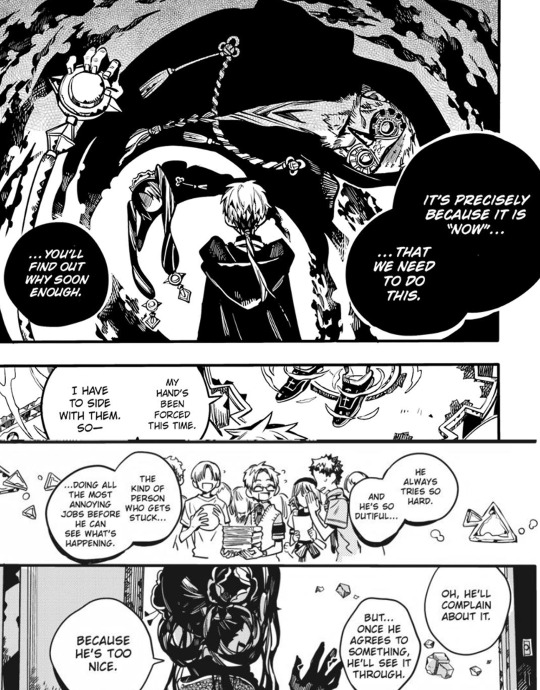
Akane’s sense of justice has always been a big part of his character, and it’s also a big part of the clock keepers. Of course he wants the present to be better and goes with the clock keepers’ idea, erasing a problem at its root to help the majority of people and protect the persons he cares for is something Akane would never refuse.
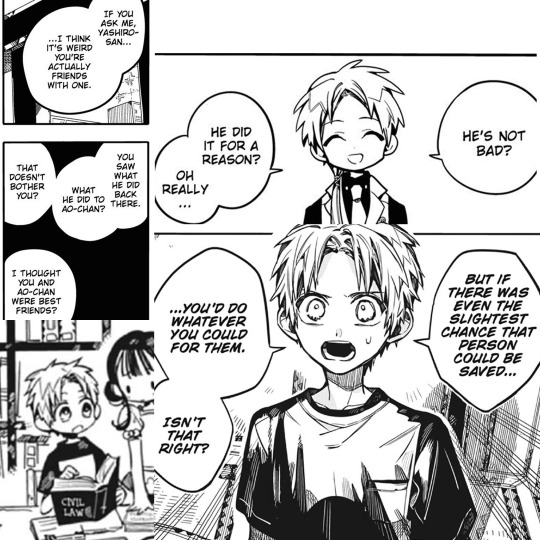
He has no problem doing it even if he doesn’t want to be on the clock keepers’ side, because he knows he can do something ‘right’. He still trusts Kako on this one, embracing his role as the guardian of the present fully. The old man did say it would be good for humans after all.
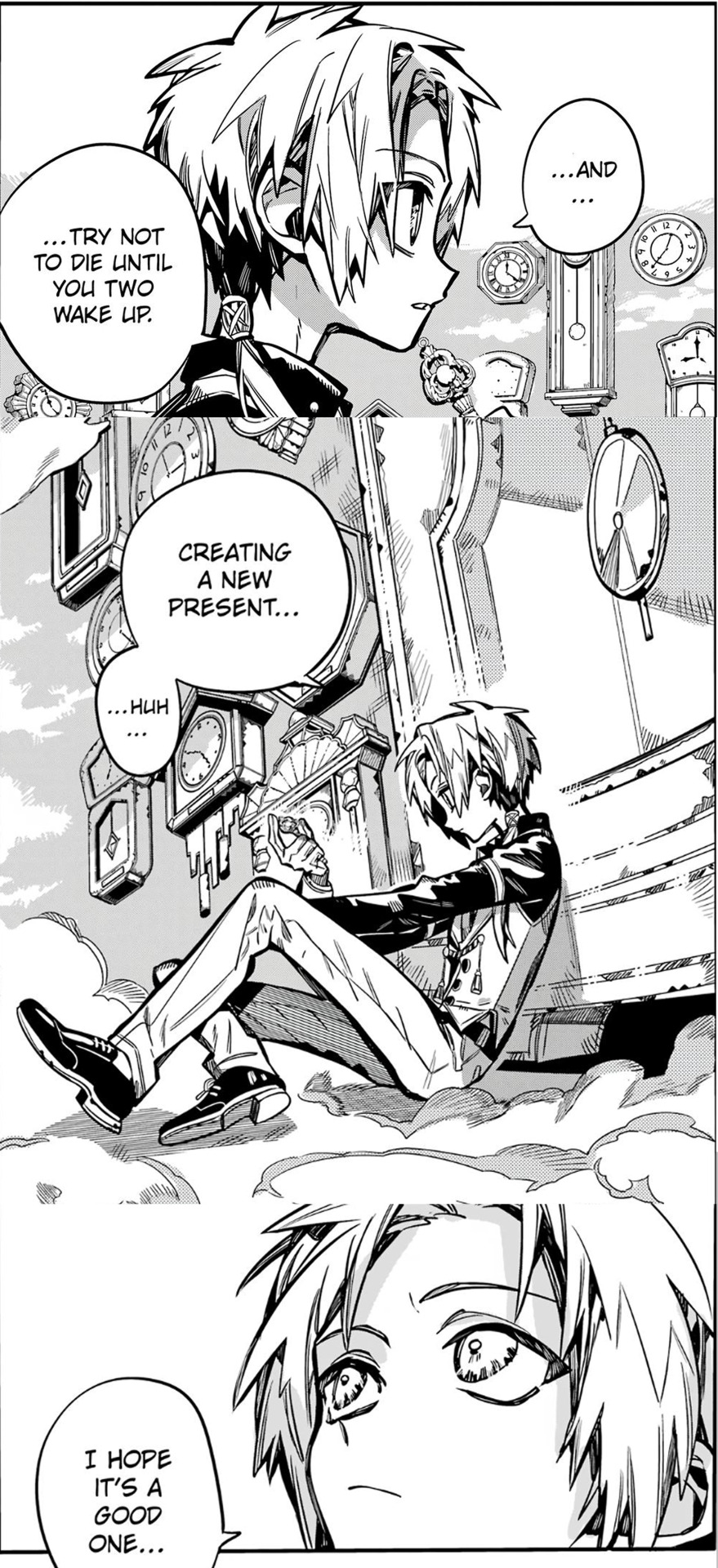
How long has Akane been thinking about changing the present? Even if it means erasing the severance I don’t know how he would react seeing that Aoi never lived it. Having a world where she never got to know supernaturals, never was left dead all alone on the far shore and never got her hand hurt. It can’t be so bad right?
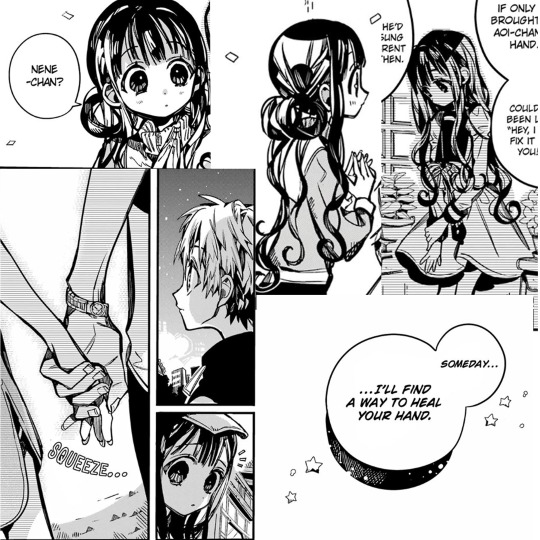
But the more I think about it the more I go ‘was this present really THAT bad?’ Aoi has to go through her horrible everyday life once again, thinking that no one will ever love her for who she is and Akane definitely doesn't want that.
His talk to Teru also implies that Teru and Nene may remember since they were stopped by his time power. He trusts Teru to understand what is happening and help him with this new reality or hoping not everything will have changed.
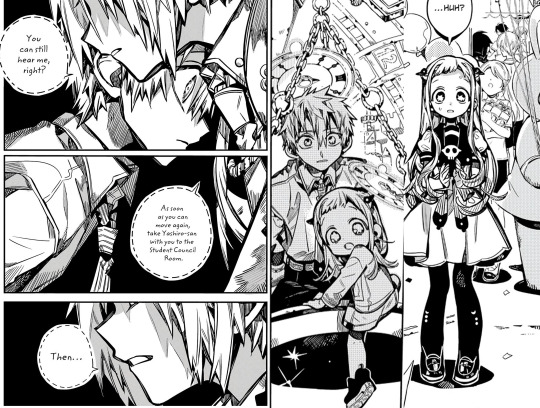
If we focus quickly on Amane and Tsuchigomori. They seem to have go back in 1968 so Amane was a middle schooler. Tsuchigomori and him had the talk about the moon in 1969 (after the 20th of July) so Tsuchi may not have the same yorishiro either. Would Amane live this time? Not sure, the reason he was trying to destroy the big clock may be related to the clock keepers going back in Time. I wonder what the clock Amane was working on really represents.
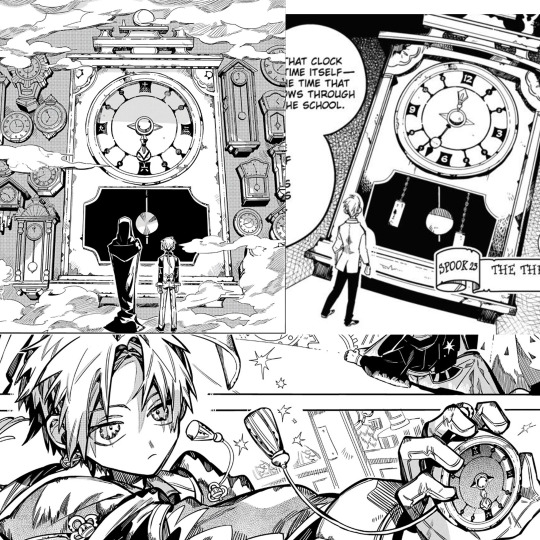
We can see this clock indicating the hour exactly like when Akane is stopping time, suggesting that it is really the one controlling the whole school time. It’s the first clock we see when the clock keepers are introduced too.
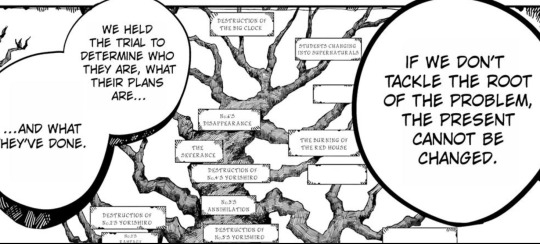
If Kako and Mirai really go back in time and erase everything they are visualizing on this. It would indeed mean a better control over the mysteries situations and the protection of the Land.
It means everything the mysteries went through won't happen. So the second Mitsuba won't exist, n°3 would still be here, Yako would still be waiting for Misaki to come back and won't go berserk, Shijima-san would still be in her boundary thinking she has no reason to exist expect hurting Mei-chan's memory, Hakubo would still be doing his duty without feeling anything and Sumire would still be living her death over and over again, not having anyone go see her in more than a century.
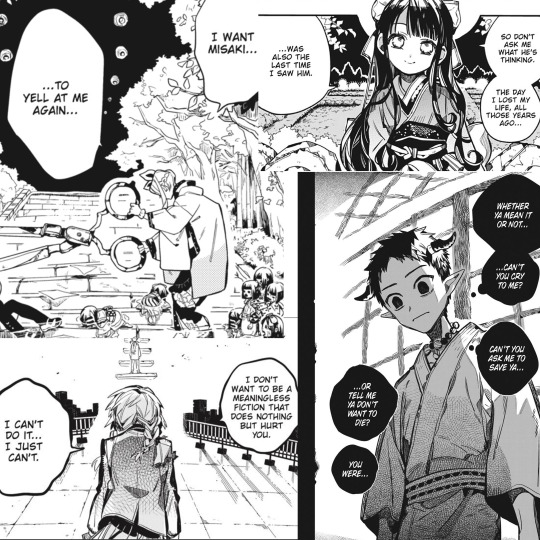
It means erasing all of the mysteries’ struggles and acceptance of what they are, not being bound by grief and regrets to do a job most of them didn't want to do. Would this present really be a good one? For the humans mostly it would be, it's the mysteries duties after all, and n°1 is ready to undo all the things each mystery went through to make sure humans have a good Present. They always have been more about humans than supernaturals. And this may also be the reason why Akane is okay with everything going on too. Kako sees this as his ultimate duty in the end, forcing all mysteries to embrace it even if they don't want to. Taking the matter at end without warning anyone since after all, no one will remember.
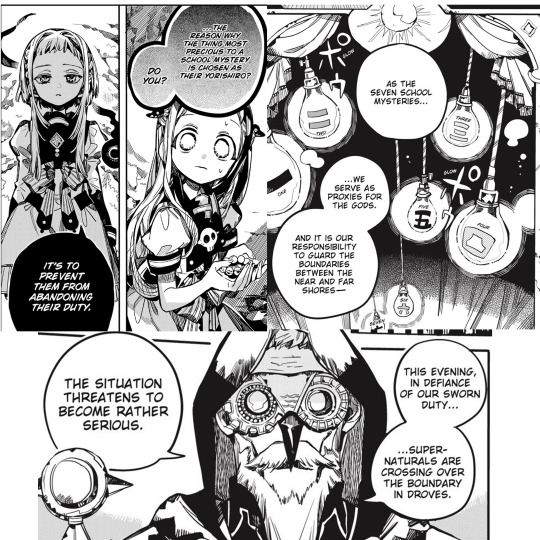

Another thing that has always been interesting to me, was the fact that the clock keepers look nothing like something out of Japanese Myths/folklore. It has always been strange to me to see they were labeled as the oldest supernaturals, when clocks weren’t that common in Japan before a long time. The way they dress look way different compared to anyone else from the cast too. The closest look you could find was from the Meiji Era, which was mostly about Japan importing a lot of Western culture into their Land. I always thought that the clock keepers just couldn’t be from a Japanese folktale and this was confirmed in the last chapter. I had my supposition about where they were from, but having an actual image of their old town helped me to focus more on it.

If we look at Clock making history we can easily focus on some countries, The Netherlands, Germany and England being the main ones. Now if we look at the architecture we get in this chapter, we can delete England from the list easily. This type of house is called Timbered framed houses. It can be found in Europe in different countries.


It’s important to note that the roofs on those houses are really really sharp on the illustration AidaIro gave us. Which means they were built for snow, so it can slide off the roofs more easily. The trees in the background are too blurry to see but it looks like forest of pines and the kids shown are holding one.
Now if I combine the two ideas of clock making and architecture I found here, my thoughts came to one city. Nuremberg in Germany. It’s a city known for its clock making history, there are mountains nearby and there is snow in this region during Winter. And more importantly The Nuremberg Egg.
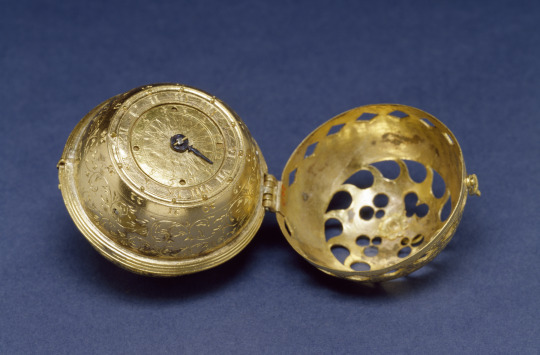
It’s known as the ancestor of the pocket watch, created in the XVIth century.

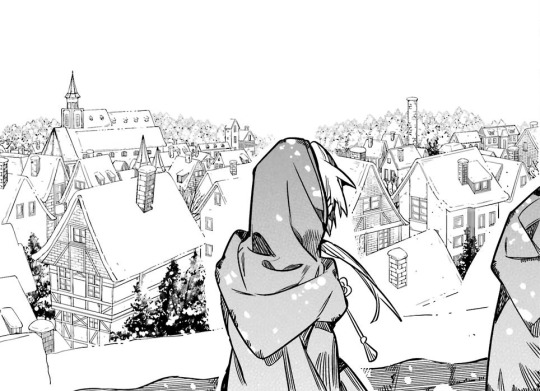
I don’t think AidaIro was inspired by a precise place but I think somewhere in this region of Europe could be a good pick for the inspiration of the city the clock keepers are from! Same can be said about the clothes the kids are wearing and the toy's shop which have vibes from this region too.
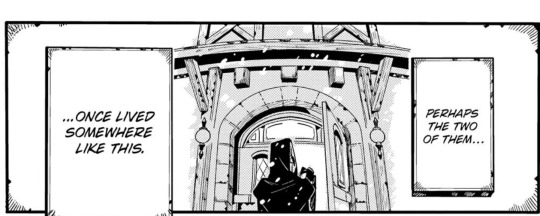
I’ve been thinking a bit more about what Kako and Mirai are really and it’s hard to say. With how Akane introduced them it could imply they were humans before.
Why did they move to Japan and how did they become supernatural? Were they created or were they humans before? The idea of Kako creating a body to survive and creating Mirai is not out of the way since he is clearly the oldest and more experienced supernatural there is. A lot of questions with no answers for now but I am happy we get some glimpse of their old life.
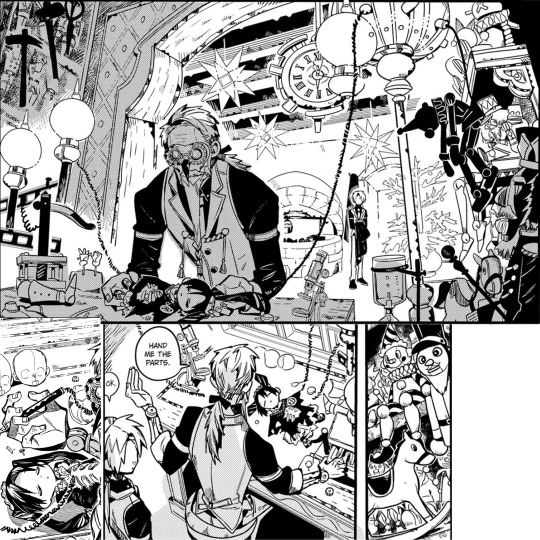
I am also interested in the clock keeper of the present status too. Are they used to create different presents or if the present is fixed their role is finished? Did Kako and Mirai go back in time to change stuff before?
I don't think it happened recently. Nothing special has been happening at Kamome even with the whole Yugi suicide/murder history. The real problems started really once Nene met Hanako and Tsukasa woke up. Kako may have been observing things since a really long time, maybe putting some students as clock keepers of the present but never ‘activating’ their real role. Which may also be why Akane never was shown that stressed out about his role as a clock keeper, why would he be if all the previous clock keepers of the present never had to do this? What is supposed to happen to them once they have fulfilled their duty? Are they erased from the timeline to represent completely this new Present? Do they get to continue their life like nothing happens, being the only person having the memories of a world which doesn't exist anymore? How long do they stay alone until the other two wake up? Why insist so much on the idea he has to stay alive? So many questions I hope we will have answers on soon.

The story of the clock keepers is still really blurry but we are slowly getting more on them . AidaIro really showed us that they were mysteries the other characters shouldn't mess with and I am all for it.
#toilet bound hanako kun#the three clock keepers#tbhk spoilers#IT'S THEM#aoi akane#mirai#kako#tbhk 111#jibaku shonen hanako kun#tbhk#ramblings#tbhk analysis#for the city of course it's the old part of the city we should look at#I love the geogesser game in the middle of this long text help me#I asked my sibling (architect) for this :DD and just yes the vibes are really this part of Europe anyways from what I know ahah#the mysteries make me super emo#they really are the ones taking the Ls here#Kako is so op idk what to do with myself I LOVE HIM SM#antagonist Kako for the mysteries my beloved too#Akane continues to make me fcking sad imagine learning all this role at 12 yo#idc if I am wrong on stuff I just love them#the seven mysteries#jibaku shounen hanako kun#this is fcking long but this insanity is more than 4 years old#and my insanity about automaton and clocks is older#a big thanks to Mari for having seen this insanity#the main problem about what I say for the new chapters is that I don t give a fck about the yugi twins so rip#maybe the whole thing is just#to set back the timeline where Amane would become a teacher or something#if he is 60+ now that would be hilarous
314 notes
·
View notes
Text
Wei Wuxian and Narrative Agency – Part Two
For Xiantober Day Three: Conviction (of a sort)... in which the author temporarily forgets to focus on narrative agency or on Wei Wuxian, in favour of analysing relevant themes and characters that relate to Wei Wuxian. But he does get focus, and again, contextualising him is why i’m exploring these other things, so no harm done.
(Part One | Part Three | Full version on AO3)
It’s Not Just Optimism: Resentment and Self-Definition
Before we discuss the narrative again, let’s take a break to discuss one of my other favourite aspects of Wei Wuxian. We’ve seen how the narrative treats tragedy, and we’ll soon explore how it reflects Wei Wuxian’s views on tragedy. But what actually are these views?
Because the thing is – the narrative and plot can emphasise agency and choice all it likes, but focusing solely on that leaves out the character. And it’s Wei Wuxian’s character that deserves the credit for how he defines himself (…in-universe). If someone had gone through everything he had, who could blame them for being unable to keep going, unable to let go of resentment, unable to see anything that was still worth living for, to see any value in altruism?
(Also, I do have to emphasise this: you can have perfectly healthy coping mechanisms, but still get extremely traumatised. Everyone has a limit to what they can take, that limit differs, and that isn’t your fault. It just so happens that Wei Wuxian’s limit is extremely high (and even he reaches it when everything falls apart in such quick succession near the end of his first life!))
This isn’t something that’s ignored in MDZS. We see multiple characters who have gone through similar levels of suffering as Wei Wuxian, or even less suffering than him*, who do react in some of the ways mentioned above. Whether or not the narrative condemns them depends on if they hold onto resentment from their tragedies and use it to harm others – Xiao Xingchen and Qin Su, for example, aren’t condemned for their suicides (nor should they be, suicide/suicidal ideation isn’t anything anyone should be blamed for), because nobody was intentionally hurt as a result. But people like Xue Yang, who was treated cruelly and senselessly lost his finger, but went on to murder an entire clan as a result; or Jin Guangyao, who remembered the slights against him and his mother down to the exact wording of Jin Guangshan’s dismissal of her freedom, which may have justly hurt him but also unjustly lead him to both burn down a brothel and (separately) kill or imprison multiple innocent prostitutes; or Jiang Cheng, whose resentment for Wei Wuxian due to the latter’s actions lead him to harm many others after his death simply because they were similar**, are condemned.
Why mention this? Well, these different reactions show it isn’t just a quirk of the universe that people are more tolerant to pain – Wei Wuxian’s reactions are a deliberate choice on the part of MXTX, not a writing flaw stemming from misunderstanding the severity of trauma***. But more importantly, many of these characters deliberately foil Wei Wuxian, and so they can give us a good insight into what sets him apart from them (or rather, from the characters who aren’t completely broken by their pain, because that way we know it isn’t simply a difference in tolerance but rather one in attitude). And as I’ve discussed, this has to do with accepting events and letting them go, rather than holding onto resentment.
Part of this may come from differences in personality (though that’s never an excuse for hurting others) – but, though Jiang Yanli may claim Wei Wuxian was someone “born with a smiling look” (Chapter 24, EXR), there are two philosophies Wei Wuxian consciously holds onto that have to do with this attitude:
“Let the self judge the right and wrongs, let others decide whether to praise or blame, let gains and losses remain uncommented on.” Chapter 75, EXR translation
“Remember the things others do for you, not the things you do for others. Only when people don't hold so much in their hearts would they finally feel free.” Chapter 113, EXR translation
And crucially, these ideas directly contrast the actions and mindsets of the antagonists above. All three focus on their ‘gains and losses’, with their suffering at the hands of others being a major motive to harm those others/those affiliated with those others (Xue Yang’s finger; the slights against Jin Guangyao and his mother due to the latter’s job; Wei Wuxian’s ‘betrayal’ and his role in Jiang Yanli’s death, as well as false blame on him for the deaths of Jiang Cheng’s parents, and Jiang Cheng’s inferiority complex). Jin Guangyao and Jiang Cheng are also very focused on their reputation, or in other words, on whether ‘others decide (…) to praise or blame’ them (according to Chapter 10 of the EXR translation, in what seems to be omniscient POV heading into Jiang Cheng’s, the latter ‘cared about maintaining his reputation above anything else’. Meanwhile, much of Jin Guangyao’s actions were taken to protect his reputation, including the brothel burning, as a part of the aim was to conceal which brothel he grew up in (Chapter 104)).
Additionally, much of Jin Guangyao’s resentment stems from how others treat (‘blam[ing]’ him, insulting him), compared to how they treat others (‘prais[ing]’ them):
“But do you know what it was that made me lose hope completely? I’ll answer your first question now. It wasn’t that I’d never be worth a single hair on Jin ZiXuan or one of the holes in Jin ZiXun, it wasn’t that he took back Mo XuanYu, it wasn’t that he tried every possible way to make me a mere figurehead either. It was the truth he once told the maid beside me when he was out indulging himself again.” Chapter 105, EXR
Though the other points didn’t make him lose hope completely, the implication is that they did affect him too (as shown by how he speaks about them), with Jin Guangshan’s words about Meng Shi being the final straw. ‘Los[ing] hope’ here of course relates to holding onto resentment, as Jin Guangyao’s loss of hope is what led him to murder out of his hatred.
Finally, both Jin Guangyao and Jiang Cheng also hold resentment due to holding onto what they’ve done for others, or even onto who they themselves are, without being treated accordingly – and though it makes sense to be hurt by all these things and these reactions are valid, the pain from holding that in your heart and the danger from holding onto it is precisely why MDZS condemns it:
“Why is it that even if I face everyone with a smile, I might not even receive the lowest form of respect, while even though your father was extremely arrogant, people flocked to him? Could you tell me why we were born from the same person but your father could relax at home with the love of his life playing with his child, while I never even dared be alone for long with my wife, shivering out of fright at first glance of my son? And I was ordered to do such a thing by my father as if it was natural—to kill an extremely dangerous figure who could flip out and conjure up a bloody massacre with his corpses anytime! “Why is it that even though we were born on the same day, Jin GuangShan could host a grand banquet for one son, and watch with his own eyes how his subordinate kicked his other son down Koi Tower, from the first stair to the last!” Chapter 105, EXR
(He brings up his role in Wei Wuxian’s downfall due to this as well, in addition to creating any excuse he can to absolve himself of others’ blame – he’s being treated unjustly and hated for something he’s done, even though he was ordered to do that thing by his father and it made sense!)
Jiang Cheng, “Are you stupid? You only counted the time to return and not the time to go there? Let alone the fact that after I got there I had to lead people and search through the entire mountain for the old banyan tree, then dig open the hole that got blocked up by Wen Chao and his people, and rescue you within seven days. Where’s your gratitude?!” (…) He raised his voice, “You killed the Xuanwu of Slaughter together with Lan WangJi, bathing in blood! How great is that?! But what about me?!” He punched his fist into a pillar in the hall, clenching his teeth, “… I have also been running around for days, completely exhausted, with not one second of rest!” Chapter 56, EXR
(And, a bonus to show this being a part of Jiang Cheng’s mindset without stemming from being hurt by a specific event, even when he’s being encouraging:)
“So it seems that both of you killed it together. What’s yours is yours. Why would you give him all the credit?” Chapter 56, EXR
(This moment is a nice display of the contrast between Wei Wuxian’s and Jiang Cheng’s mindsets as well, with the former focusing on what Lan Wangji (‘others’) did for him instead of seeking credit for his role!)
To repeat – of course these feelings are understandable, and I’m not blaming them for feeling this way. What I am placing blame on is letting those feelings drive you to murder many innocent prostitutes, or to let this sense of a debt you’re owed (which is what the philosophy is actually warning away from, because if you hold onto what you do for others, the natural expectation is that they’re indebted to you and should do something for you as a result) turn into resentment towards someone for not acting the way you think they should, leading you to help murder them, even if your sister sacrificed herself specifically to save their life.
This is the danger of holding onto resentment. And are these actions not a choice? Would you, independent of MDZS, absolve someone of a crime because their ‘personality just leads them that way’?
The same is true for acting on these two philosophies, and letting resentment go. And it’s all the more impressive when someone has as much potential resentment to hold onto as Wei Wuxian does.
Of course, Wei Wuxian himself isn’t completely infallible – which further supports the idea that this isn’t just a natural, unalterable quirk, since we see him act contradictory to his usual self as well. But the narrative’s view of resentment in these moments doesn’t change. Importantly, the times he does let resentment drive what he’s doing, during the Sunshot Campaign and Nightless City (as well as him being quick to anger at Phoenix Mountain, etc), it isn’t presented as in the right**** — and though he still lets go of it quickly enough to protect a group related to the one that hurt him (people of the Wen sect, the cultivators who participated in the Siege), it doesn’t prevent the harm done during these times. Additionally, the times he metaphorically can’t control and reign in his resentment in the form of guidao – at Qiongqi Path and, again, at Nightless City – pain is caused to innocents (Jin Zixuan and Jiang Yanli). This is what his internal thoughts have to say when he comes across cultivators gossiping about him, shortly after Wen Qing and Wen Ning have sacrificed themselves:
No matter what he did, not a single good word would come out of these people’s mouths. When he won, others feared; when he lost, others rejoiced. Chapter 77, EXR
He’s hurt by other people praising and blaming him! Holding onto this philosophy isn’t automatic, that decision isn’t simply encoded within him somehow.
But that brings us to another relevant theme: that these characters aren’t infallible, because they’re not mythical creatures or concepts brought to life. Everyone is human.
However, although he thought that his heart was like a stone, in the end, he was still human, not some emotionless grass or plant. Chapter 8, EXR
OuYang ZiZhen, “HanGuang-Jun, why did Senior Wei collapse?” Lan WangJi, “Fatigue.” Lan JingYi was amazed, “I thought that Senior Wei would never get tired!” The other boys felt somewhat astonished as well. That the legendary YiLing Patriarch could collapse from fatigue from dealing with walking corpses—they all thought that the YiLing Patriarch should be able to settle them with just a snap of his fingers. However, Lan WangJi shook his head. He only said four words, “We are all human.” They were all human. How could a human be tireless? How could they stand forever? Chapter 84, EXR
Even with Wei Wuxian’s temperament, even with his attitude, he’s still human! Just as he’s not immune from being affected by harsh words to do with his past, just as he’s not immune from being affected by exhaustion, he’s not immune to being hurt by or angry at his circumstances. As we see in the Sunshot Campaign and at Nightless City, he’s not immune to dwelling on his misfortunes, to being driven by his hurt and anger and by resentment he holds onto (consciously! At Nightless City, Wei Wuxian deliberately accepts the curses thrown at him, because ‘anger was the only thing that could suppress the other feelings within his heart’ (Chapter 78)).
But nearly always, he chooses not to. The Wen remnants he saved were innocent, yes, and Wen Ning and Wen Qing helped him previously – but in his second life, he could’ve easily kept holding onto his resentment and left the cultivators who besieged him, who killed him and those under his protection, to die at the Second Siege. But he didn’t! He held true to his own philosophy, to judge the right and wrongs yourself independent of what others do, and saved them.
Because this is what’s important to him, because this is how he wishes to act in the present, and because he doesn’t let himself be defined by the tragedies he went through.
The donkey seemed as if it knew that he wasn’t in a great mood [due to others bringing up what happened in his past], and for once, it wasn’t being loud out of impatience. A moment of silence passed, and it turned around to leave. Wei WuXian sat by the stream, not responding at all. It turned around to look, throwing its hooves onto the ground, but Wei WuXian still paid no attention to it. The donkey had to come back sulkily, biting and tugging on the corner of Wei WuXian’s collar. He could choose to go, and he could choose to not go. Seeing that the donkey had [gone] as far as to use his mouth, Wei WuXian decided to follow him. Chapter 8, EXR*****
Immediately after this, he’ll continue investigating the puzzle of Dafan Mountain’s night hunt; he’ll come across a ghost, ask where it’s hurt and offer to take a look at it; he’ll rush off to save Jin Ling and the Lan juniors, figuring out the truth behind the dancing goddess and being the only one to do so. Just as it’s more important to the narrative, this – quick thinking, problem solving, compassion, doing the right thing, even seeking out excitement – is what Wei Wuxian finds more important about his own self, and what he chooses to focus on.
Some final questions to end things.
If you saw Wei Wuxian, without any knowledge of what happened in MDZS, without any work done by the narrative structure or by knowledge of tropes – would you have expected the backstory he had? Would you expect his parents to have died when he was at an age where he could barely remember them? Would you expect him to have lived on the streets until he was nine years old, or to have been taken into an unjust and extremely volatile household, or to have (chosen to) lose the source of powers he was very proud of – shortly before he was thrown, now powerless, into the equivalent of hell for three months? Would you expect his first life to have ended because protecting innocents (knowingly) led to the entire world crusading against him, because their siege resulted in him being torn apart? Or would you not think of tragedy when it comes to this person who gleefully jokes and teases, who’s so smart and competent and knows it, who doesn’t focus on the negatives, who acts so confidently on his morals, who revels in life so much?
If you only saw Wei Wuxian’s backstory with no context of his character, would you expect him to remain this way?
And, if you saw Wei Wuxian’s actions in the present day, without knowing what tragedies happened in his past, would he feel like an incomplete character?
It’s impossible to answer, of course – even in the present day, you get information about his past.
But I’m inclined to say no.
(Part One | Part Three | Full version on AO3)
—
*But again, let me emphasise – especially in real life, doing the trauma olympics is never good! As I said, everyone has limits, everyone’s limits differ, and just because one person can cope with something doesn’t mean another person can, even with the same mechanisms. And that shouldn’t lead to any judgement!
I say ‘especially in real life’ because in fiction, some characters’ experiences are often made similar or different to others’ in order to parallel or foil them – in which case comparison is often the point. But trauma olympics (‘this person suffered x amount so the other person should be able to take it!!’) is still bad, guys (especially since, as with MDZS, those parallels or foils are often there to explore the harm they do to others as a result, not simply how much trauma they can take).
**My thoughts on rumours here. Tl;dr, if Jin Ling (someone who’d want to defend him!) is saying he did (and that he “never let anyone go” – Chapter 24), if sources like Lan Wangji and Lan Sizhui act as if this is the case (Chapter 10 – to defend, you could say personal feelings play a role, but Lan Wangji especially is someone who knows not to, and explicitly doesn’t, make judgements without conclusive evidence. Again, see my thoughts on rumours) – and if Jiang Cheng backs up this behaviour (eg by telling Jin Ling to kill every demonic cultivator he sees and feed them to his dogs in his introduction – Chapter 7), it’s probably not a simple unbased rumour. There’s enough evidence to support its veracity.
***However, do note that Wei Wuxian isn’t an outlier, either – Lan Wangji, Wen Ning and Lan Sizhui (once he learns of his heritage) are all examples of other characters who aren’t overcome or twisted by their pain, instead still aiming to make the world a better place. And this is Jin Ling’s whole arc, too!
****I delve a lot more deeply into this here!
*****The role this moment plays isn’t actually something I caught myself – it came from a post about a reread of MDZS’ earlier chapters. I can’t find it myself, but if anybody has the link, that would be great (so I can cite it)!
—
Also, a shoutout to this incredible meta by @righteousinadversity – it’s what made me want to delve into this aspect two years ago! It’s still one of my favourite metas, and you enjoyed this, you’ll definitely enjoy that, too.
#yes i did gush a bit at the end but it’s *xiantober* it’s the wwx gushing month!#also re ‘antagonist’ and jc – i don’t want to get into discourse but there are two facts#1) an antagonist is someone who opposes or hinders the protagonists (regardless of their morality - eg L in death note is one)#2) jc is someone who does oppose and hinder the protagonists (capturing wwx in present day + being hostile to wangxian + besieging him in-#-his first life… and in his second life)#sure he isn’t one CONSISTENTLY (not throughout a lot of the flashbacks + during the second siege + in guanyin temple)#but that’s still a frequent role he PLAYS#regardless of how you think he should be presented or what you think he’s feeling – that’s the function his actions serve in the novel#anyway fic for day two will come but it’s still being worked on — i was in an analysis mood today so decided to do this first#mdzs meta#my meta#mdzs#wei wuxian#mo dao zu shi#魔道祖师#grandmaster of demonic cultivation#gdc#jin guangyao#jiang cheng#(<- a little scared of this tag but he does feature a lot)#xiantober day 3#this does admittedly feel less focused than the previous part but maybe i’ll rewrite it later
59 notes
·
View notes
Text
i was having a pretty good day ngl, but then i was forced to bare witness to another “NINE BAD AND EVIL!!!!!” video
#graveyardtxt#dude that video has to be rage bait#anyway the bait worked. but it worked solely because i’ve never been so dumbfounded by someone’s misinterpretation of nine’s character#it’s genuinely the worst analysis of nine i’ve ever seen#“he became evil because he was bullied and was a loser’’ DO YOU HEAR YOURSELF#did you miss the part when nine said the harassment lasted for years?? that he was basically outcasted from society???#did you miss when he believed that sonic betrayed him and wanted to erase his existence?? did we miss that entire scene??#istg this guy only watched season 3#nine isn’t just “bully victim become evil!!!’’ character. he wasn’t the antagonist until season 3#and he became the antagonist because of the numerous miscommunications between him and sonic#ripping my hair out#i thought people misinterpreting nine this badly was a myth. maybe even a twitter phenomenon#but i was mistaken#miles nine prower#sonic prime
44 notes
·
View notes
Text
I am BEGGING (some of) you to learn what a literary foil is:
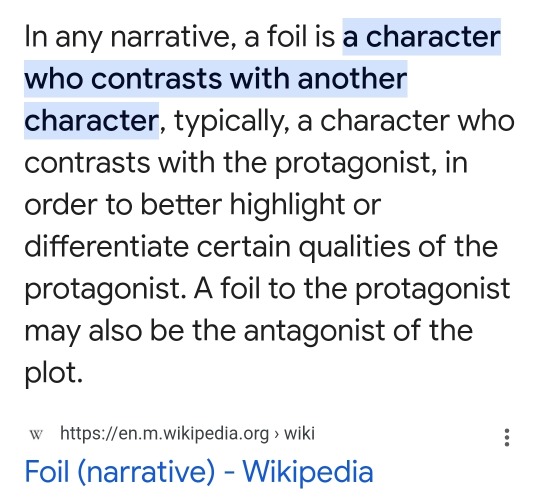
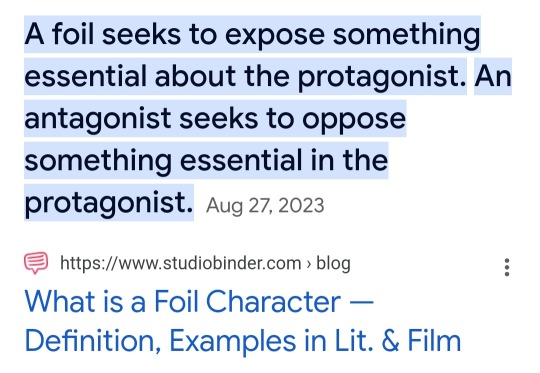
Examples:
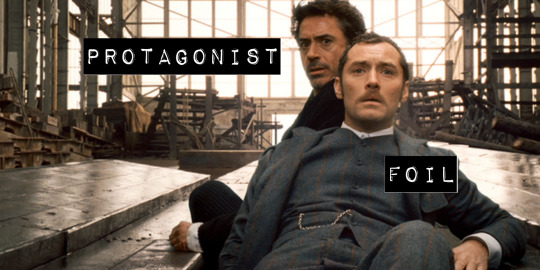
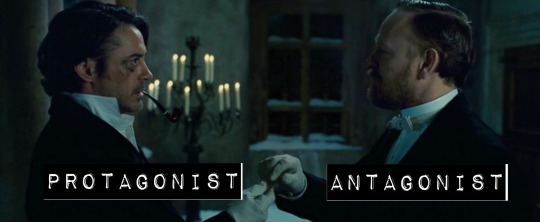
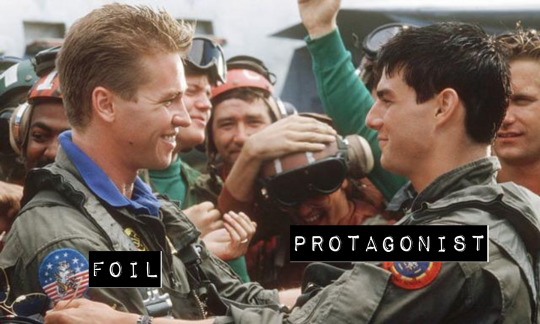
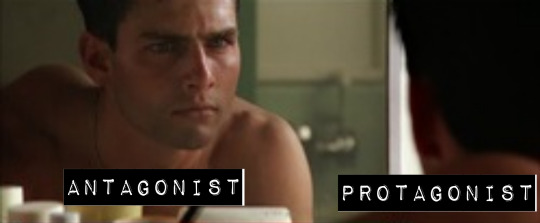
Thank you for coming to my TED Talk.
#Your girl doing some chill literary analysis#If I read one more time that Iceman Kazansky is the antagonist of Top Gun it will become my villain origin story
105 notes
·
View notes